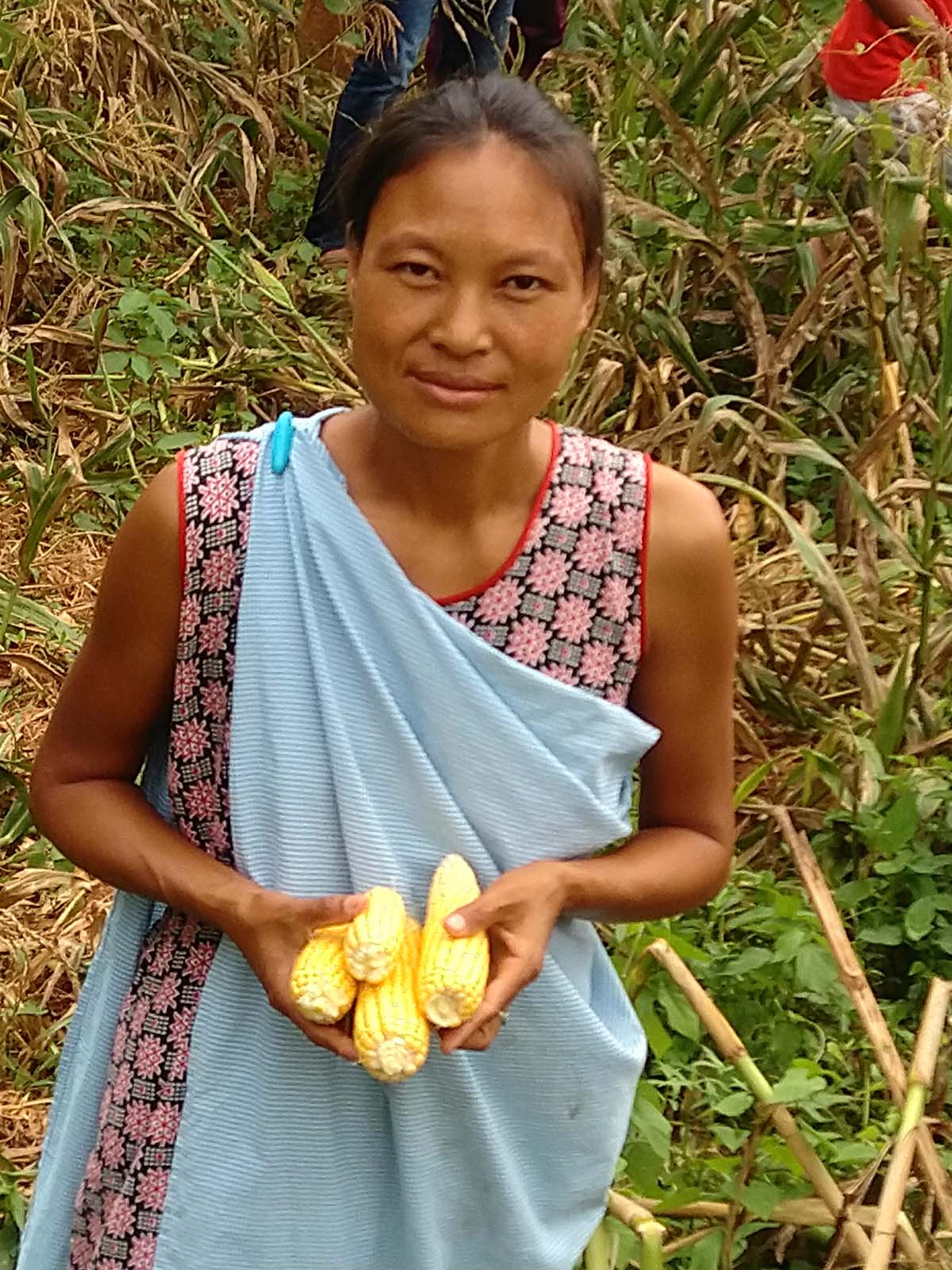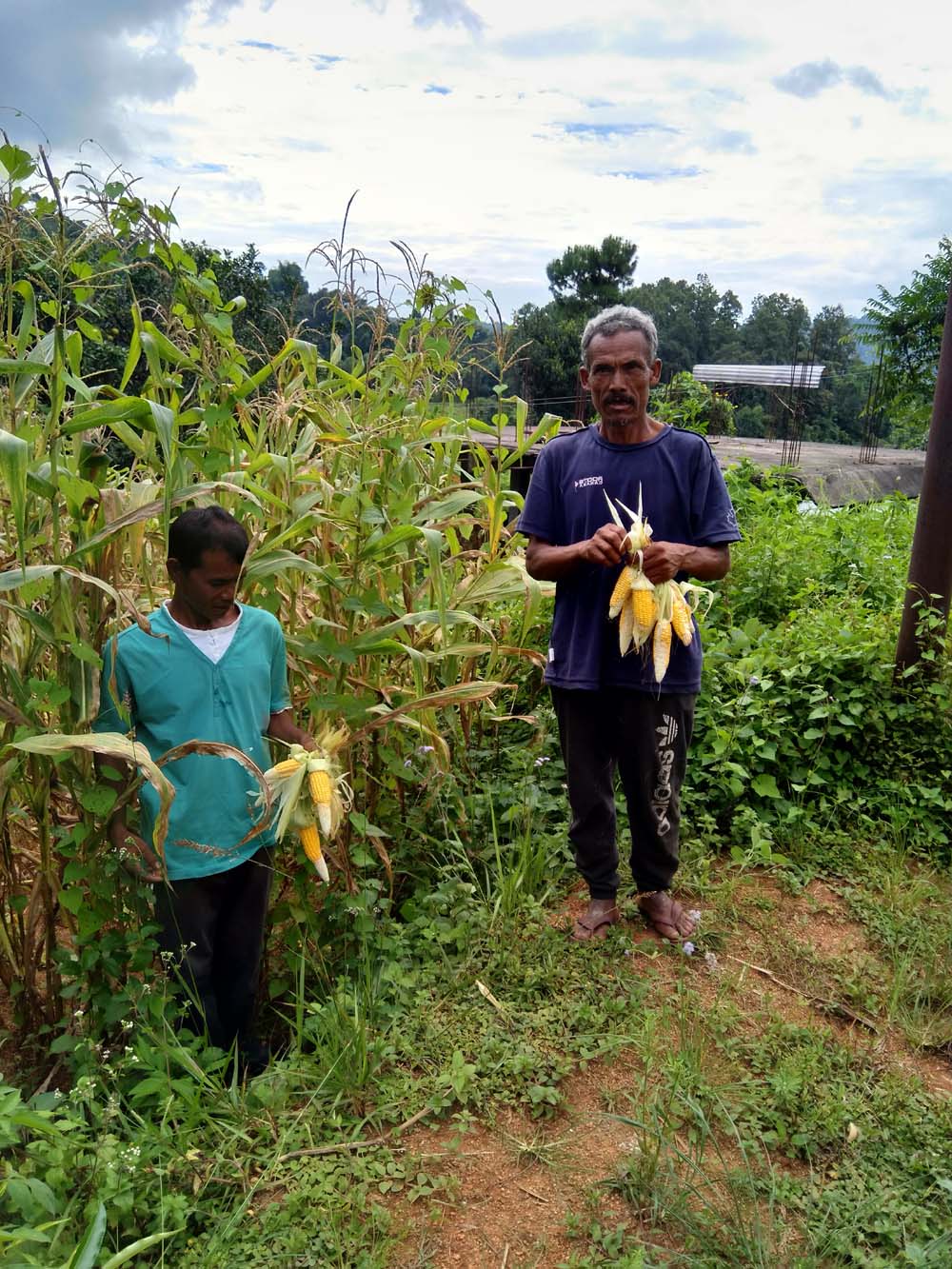School of Crop Improvement :
+ Genetics and Plant Breeding
+ Plant Molecular Biology and Biotechnology
Background :
With rapid increase in population and urbanization, there will be a need to increase productivity by nearly 50% by 2050. Despite being the hub for crop biodiversity, increasing crop productivity per unit resources in the NEH region remains a challenge. The fragile ecosystem of NE region makes this region a challenge to identify and address agricultural issues of both regional and national interest. The fact that, 80% soils of this region are acidic (pH in the range of 4-5) and receives heavy rainfall, makes the issues pertaining to increasing productivity more complex. To meet these demands it is necessary that researchers from different specialized areas like genetics, breeding, molecular biology and biotechnology work together towards sustainable solution to achieve the target.
Issues and Strategy :
>> Rice is the main crop grown during Kharif season throughout the region. The region is still not self-sufficient in rice production. There is a need to develop input use efficient varieties which are better suited to the needs to the farmers (who grow this crop mostly organically, with minimal input). Varieties which are able to better utilize the low phosphorus and tolerate high level of iron, aluminum, manganese; etc under acidic soil conditions will be needed. Markers associated with tolerance to these nutritional deficiencies and toxicities as well as other abiotic stresses like cold and low light will help in breeding varieties suitable for the region. Several biotic stresses like blast as well as blight also cause severe damage. It would imperative to have durable disease resistant varieties with multiple resistance gene combinations. For leaf blast, more than sixty genes are reported in rice but neck blast is just beginning to be understood. These will be some of the key areas of research in rice. Moreover, indeginous specialty rices with micronutrients and aroma are popular in this region. Most of these specialty rices are bold seeded with aroma and many a times with red or purple colour. Breeding strategies to enhance yield potential of quality rice will be needed. This would require characterization of the germplasm with respect to key traits and molecular markers, development of breeding populations with an aim to increase yield, quality traits and resistance to insects and pests. The aim would be to have certain specialty rices with desired traits and associated markers available, so that these rices can be grown and maintained and maybe sold for premium prices. The markers associated with the varieties will be used for maintaining seed stock quality as well as for DNA fingerprinting.
>> Maize is another major crop of this region, which is primarily used as animal feed. Though many maize hybrids have been released in the past, there is a need to have hybrids suitable to the special agro-geo needs of the NEHR. This includes tolerance to aluminum toxicity, water logging, etc, and resistance to various diseases like turcicum blight, etc. The maize hybrids that need to be developed will have to be good yields as well as enriched in key amino acids to act as suitable animal feed. The markers already available for some of the traits like QPM, turcium blight can be used for initial selection and identification of suitable parents, however, a sustainable maize development programme would require, a thorough characterization of all the released hybrids and available markers. There is a need to develop new markers tagged to new hybrids that will be generated to meet the needs of the region.
>> In the rabi season, in most of the states of NEHR, majority of the land remains fallow. There is an urgent need to use the land available during the rabi season for cultivation of crops like rapeseed mustard (both for vegetable and oil production), lentil, linseed, peas, etc. The oilseed and pulse production will not only make the resource-poor farmer self sufficient but also provide nutritional security. Though the efforts in this direction have already started, there will be a need to make sure that growing of a rabi crop becomes part of the agricultural practice. This will require introduction of varieties which are tolerant to acidic soil, short duration, requiring less water, etc. A well thought molecular breeding approach will expedite this process to achieve early results. Research on transgenic pulses, mustard having resistance to insect, pests, etc and their introduction will also help in achieving the target.
>> There are many plant species like pungent chillies, ginger, turmeric, tree bean, Khasi mandarin, chow-chow, etc, indigenous to this region (this being one of the biodiversity hotspots) which will need to be better conserved and utilized. Development of markers for early selection, varietal identification, barcoding, etc would play a crucial role in targeted utilization of such crops. Many of these crops and several others which are widely cultivated in this region lack quality planting material. Micro propagation can be used to generate good quality planting material in large numbers and these can then be distributed to farmers for cultivation.
>> Organic produce can bring about the much required financial security to the farmers of the NEH region. However, with low crop productivity and intensity in the region, the benefits of high value organic produce may be negated. Organic farming essentially requires no use of inorganic inputs for soil amelioration, disease and pest control, and soil fertilization. Although organic options for the purposes are available, ensuring their large scale production and availability is a challenge. In this scenario, development and deployment of crop varieties that are genetically Input- use efficient, biotic and abiotic stress tolerant and widely adaptable would prove to be an economically viable and sustainable option. In this endeavour, the several initiatives taken up by Central Agricultural University, Imphal in terms of basic and applied research to enhance crop productivity in the NEH region, will have to be scaled and multiplied to have fruitful gains.
>> Farmer participatory breeding and selection can be taken up with promising varieties in all the crop species discussed above for quick and successful dissemination of technology.
>> Human resource development in the field of Crop Improvement would remain a primary focus to meet the demands of research. Students will have to be trained in the area of modern breeding, basic molecular techniques, tissue culture so that they can meet the demands of agriculture as well as understand and utilize new emerging technologies. The region and nation will require not only dedicated research workers but also entrepreneurs who would be willing to take up the emerging challenges in the agriculture sector.
+ M.Sc. in Genetics & Plant Breeding, Plant Molecular Biology and Biotechnology
+ Ph.D. in Genetics & Plant Breeding, Plant Molecular Biology and Biotechnology
[ Legend : * = Core Course; For MSc = Code 500 Series, For PhD = Code 600 Series ]
Teacher: DS- Devyani Sen; MR- Mayank Rai; KNS- K. Noren Singh; PP- Pramod Pandey; NTM- Ng Tombisana Meetei; WT- Wricha Tyagi; PBK- Preeti B. Konwar; SSS- course offered by School of Social Sciences
Semester I Courses :
| Code | Course Title | Credits | Teacher |
| GP501* | PRINCIPLES OF GENETICS | 2+1 | MR/DS |
| GP502* | PRINCIPLES OF CYTOGENETICS | 2+1 | DS |
| GP503* | PRINCIPLES OF PLANT BREEDING | 2+1 | KNS |
| GP509* | BIOTECHNOLOGY FOR CROP IMPROVEMENT | 2+1 | MR/PP |
| MBB 501* | PRINCIPLES OF BIOTECHNOLOGY | 2+1 | NTM |
| MBB 502* | FUNDAMENTALS OF MOLECULAR BIOLOGY | 3+0 | WT |
| MBB 507 | MOLECULAR BREEDING | 2+0 | MR |
| MBB 553* | BIOSTATISTICS AND COMPUTERS | 2+1 | SSS |
| GP601 | PLANT GENETIC RESOURCES AND THEIR UTILIZATION | 2+0 | KNS |
| GP604* | MOLECULAR AND CHROMOSOMAL MANIPULATIONS FOR CROP BREEDING | 2+0 | NTM |
| GP608 | ADVANCES IN BREEDING OF MAJOR FIELD CROPS | 3+0 | MR |
| MBB 601 | ADVANCES IN PLANT MOLECULAR BIOLOGY | 3+0 | WT |
| MBB 604 | ADVANCES IN CROP BIOTECHNOLOGY | 3+0 | NTM |
| Code | Course Title | Credits | Teacher |
| GP504* | PRINCIPLES OF QUANTITATIVE GENETICS | 2+1 | DS |
| GP508* | CELL BIOLOGY AND MOLECULAR GENETICS | 2+1 | MR |
| MBB 503* | MOLECULAR CELL BIOLOGY | 3+0 | WT |
| MBB 504* | PLANT TISSUE CULTURE & GENETIC TRANSFORMATION | 1+2 | NTM |
| MBB 505* | TECHNIQUES IN MOLECULAR BIOLOGY I | 0+3 | WT |
| MBB 552* | BASIC BIOCHEMISTRY | 2+1 | NTM |
| PP-509 | PHYSIOLOGY OF CROP PLANTS-SPECIFIC CASE STUDIES | 2+0 | PBK |
| GP602 | ADVANCED BIOMETRICAL AND QUANTITATIVE GENETICS | 2+1 | DS |
| GP603* | GENOMICS IN CROP IMPROVEMENT | 2+1 | MR |
| GP605* | ADVANCED PLANT BREEDING SYSTEMS | 2+0 | MR |
| MBB 509 | TECHNIQUES IN MOLECULAR BIOLOGY II | 0+3 | WT |
| MBB 508 | GENOMICS & PROTEOMICS | 2+0 | WT |
| MBB 602 | ADVANCES IN GENETIC ENGINEERING | 3+0 | WT |
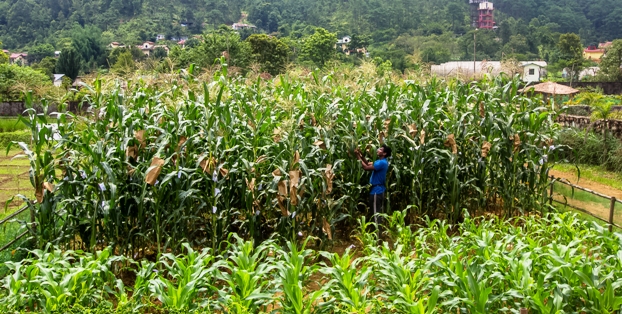
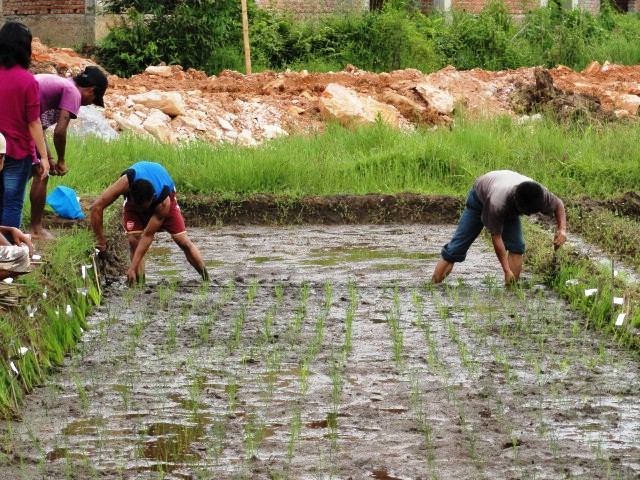
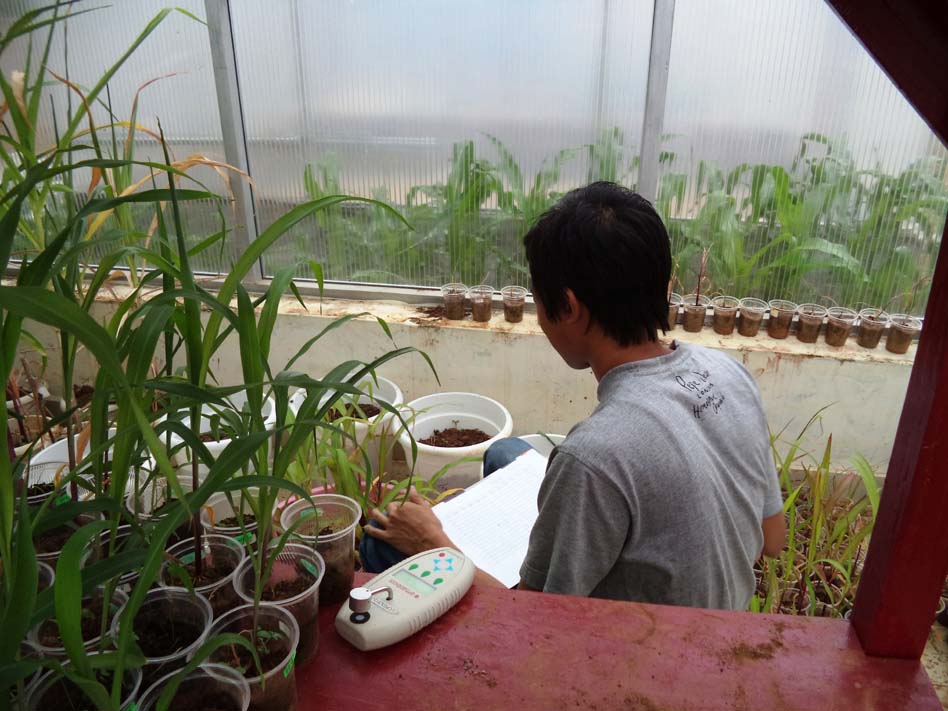
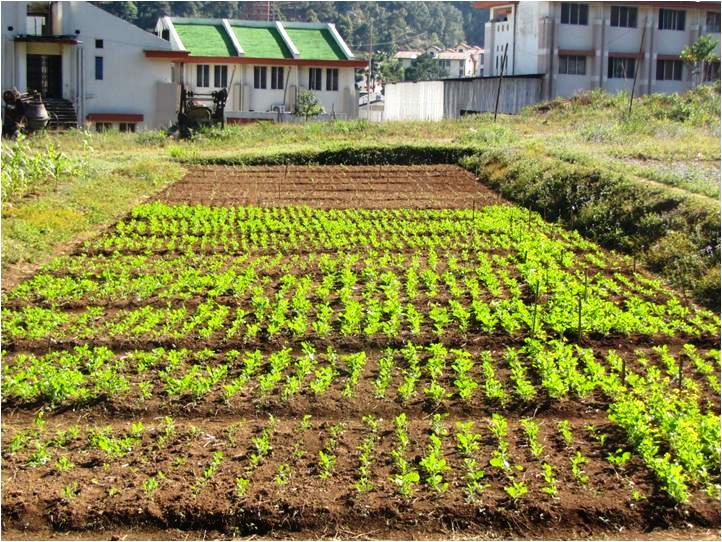
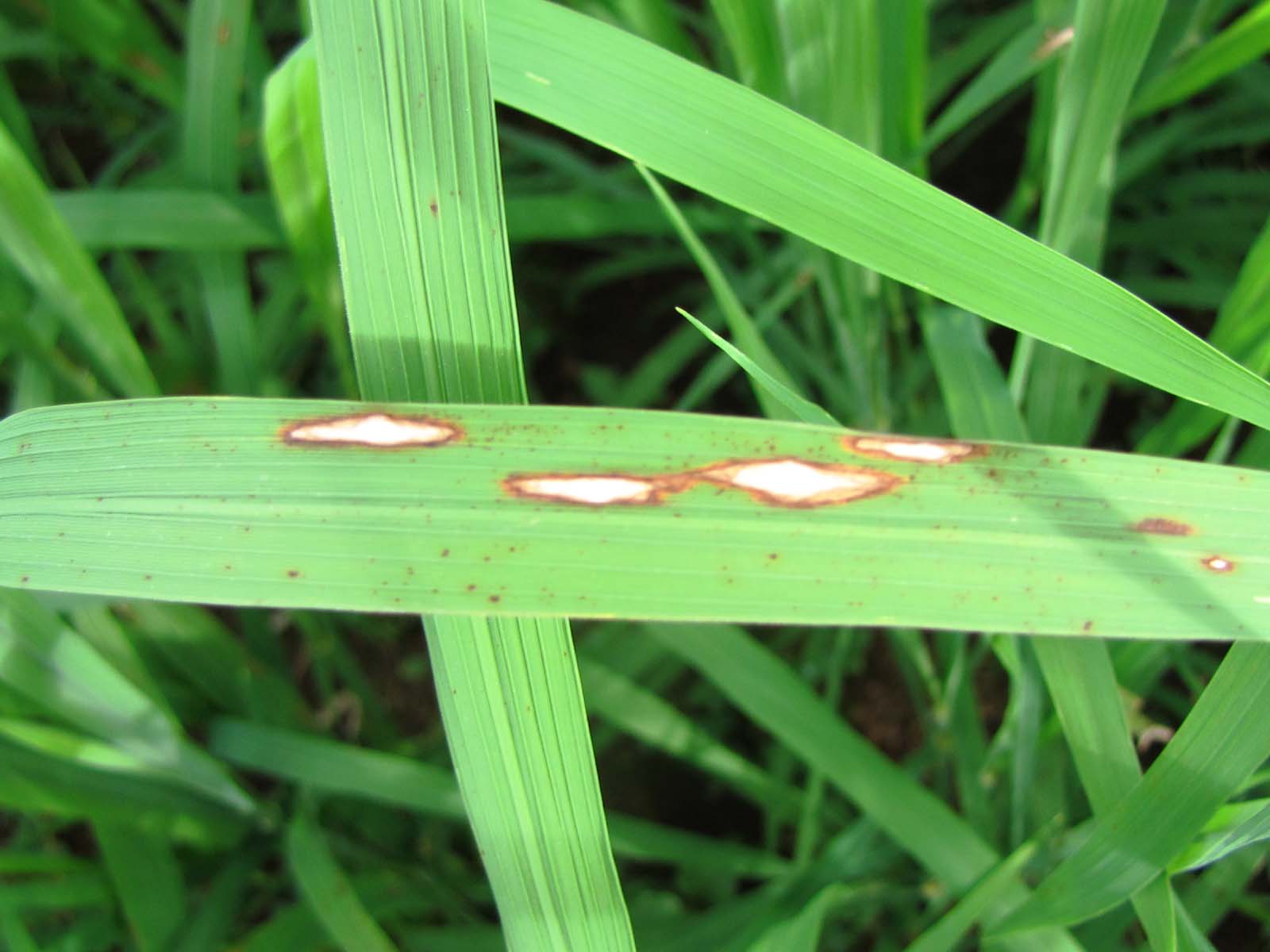
Thrust Areas and Researchable Issues :
>> Assessment, exploration, conservation and utilization of regional agro-bioresources.
>> Understanding genetic and molecular mechanisms underlying important traits like yield, biotic and abiotic stress tolerance, fertilizer use efficiency, etc. for crop improvement.
>> Production of quality planting materials for location specific-agro-ecosystems
Research Papers :
1) Colney L, Tyagi W and Rai M (2018) Morphological and molecular characterization of two distinct chilli cultivars from North Eastern India with special reference to pungency related genes. Scientia Horticulturae. 240: 1-10. doi.org/10.1016/j.scienta.2018.05.045. (NAAS rating: 7.76)2) Dutta SS, Tyagi W, Pale G, Pohlong J, C Aochen, Pandey A, Pattanayak A and Rai M (2018) Marker-trait association for low-light intensity tolerance in rice genotypes from Eastern India. Molecular Genetics and Genomics. doi.org/10.1007/s00438-018-1478-6. (NAAS rating: 8.73)
3) Bhutia KL, Khanna VK, Meetei Ng. T and Bhutia ND (2018). Effects of climate change on growth and development of chilli. Agrotechnology 7: 180. doi:10.4172/2168-9881.1000180.
4) Devi YS, Pandey A, Kumar A, Ansari MA, Tyagi W, Rai M (2018) Genetic divergence, path coefficient and cluster analysis of ricebean (Vigna umbellate) genotypes in the mid-altitudes of Meghalaya. Indian journal of Agricultural Sciences. 88(7): 1054-62. (NAAS rating: 6.23)
5) Sanjenbam M, Sen D, Tyagi W and Chand R (2018). Phenotypic Diversity Analysis and Screening for Northern Corn Leaf Blight Resistance in Maize (Zea mays L.) Landraces Grown in North Eastern Hill Region of India. Indian J. Plant Genet. Resour. 31(3): 286-294. DOI 10.5958/0976-1926.2018.00033.5 (NAAS rating: 5.12)
6) Das S, Tyagi W, Rai M and Yumnam JS (2017) Understanding Fe2+ toxicity and P deficiency tolerance in rice for enhancing productivity under acidic soils. Biotechnology and Genetic Engineering Reviews 33:1, 97-117. (NAAS rating: 5.00)
7) Yumnam JS, Rai M and Tyagi W (2017) In silico characterisation of novel rice transcripts differentially expressed in phosphorus deficient conditions suggests a role of these transcripts in multiple abiotic stresses. Acta Biologica Hungarica 68(4): 398-411. (NAAS rating: 6.44)
8) Tyagi W and Rai M (2017) Root transcriptomes of two acidic soil adapted Indica rice genotypes suggest diverse and complex mechanism of low phosphorus tolerance. Protoplasma 254: 725-736 (NAAS rating: 8.46)
9) Bhutia KL and Tyagi W (2017) Use of sequence specific nucleases for site specific modification of plant genome for crop improvement. International Journal of Agricultural Science and Research 7 (5) 491-502. (NAAS rating: 4.13)
10) Dutta SS, Pale G, Pattanayak A, Aochen C, Pandey A and Rai M (2017) Effect of low light intensity on key traits and genotypes of hilly rice (Oryza sativa) germplasm. Journal of Experimental Biology and Agricultural Sciences 5 (4): 463-471. (NAAS rating: 5.07)
11) Verma SKM and Tyagi W (2017) Tissue specific expression in plants: A review on seed specific promoters. International Journal of Current Microbiology and Applied Sciences 6(8). (NAAS rating: 5.38)
12) Dutta SS, Tyagi W and Rai M (2017) Physiological and molecular response to low light intensity in rice: A review. Agricultural Reviews 38(3) 209-15. (NAAS rating: 4.37)
13) Ghosh T, Rai M, Tyagi W, and Challam C (2016) Seedling stage low temperature response in tolerant and susceptible rice genotypes suggests role of relative water content and members of OsSNAC gene family. Plant signaling and behavior e1138192.
14) Dutta SS, Das S, Pale G, Langrai B, Aochen C, Rai M, Pattanayak A (2016) Current status and future prospects of research on genetically modified rice: A review. Agricultural Reviews 37(1)10-18 (NAAS rating: 4.37)
15) Singh R, . Rai M et al., (2016) From QTL to variety-harnessing the bene?ts of QTLs for drought, ?ood and salt tolerance in mega rice varieties of India through a multi-institutional network. Plant Science 242: 278-287. (NAAS rating: 9.71)
16) Bhutia KL, Meetei NT and Khanna VK (2016) In vitro regeneration of Dalle Khursani, an important Chilli cultivar of Sikkim, using various explants. Agrotechnology doi.org/10.4172/2168-9881.1000142.
17) Pyngrope AH, Noren SK, Tyagi W, Sen D, Khanna VK and Pattanayak A (2015) Genetic diversity analysis of blackgram [Vigna mungo (L.) Hepper] using morphological and molecular markers. International Journal of Applied and Pure Science and Agriculture 1(8): 104-113.
18) Meetei NT and Singh KN (2015). Mirco-rhizome induction in Sying Makhir, an important ginger cultivar of Meghalaya. Vegetos 28(4): 29-34.
19) Sapam RK, Khanna VK, Pandey A and Rai M (2015). Quantitative evaluation of lentil (Lens culinaris Medikus.) germplasm under low-input acidic upland soil conditions of North East India. Indian J. of Genet. 74 (4 Suppl):682-687. (NAAS rating: 6.41)
20) Tiwari KK, Singh A, Pattnaik S et al. (2015). Identification of a diverse mini-core panel of Indian rice germplasm based on genotyping using microsatellite markers. Plant Breeding doi:10.1111/pbr.12252. (NAAS rating: 7.39)
21) Challam C, Ghosh T, Rai M, Tyagi W (2015) Allele mining across DREB1A and DREB1B in diverse rice genotypes suggests a highly conserved pathway inducible by low temperature. J. Genet. 94: 231-238. (NAAS rating: 6.67)
22) Chulet H, Noren SK, Tyagi W, Meetei NT, Khanna VK, Pattanayak A, Datt S, Choudhury PR and Kumar M (2014) Assessment of genetic diversity in pea (Pisum sativum L.) using morphological and molecular markers. Indian J. Genet.74(2): 205-212. (NAAS rating: 6.41)
23) Dkhar F, Rai M, Tyagi W (2014) Looking beyond PsTOL1: marker development for two novel rice genes showing differential expression in P deficient conditions. Journal of Genetics 93: 573-577. (NAAS rating: 6.67)
24) Challam C, Kharshing GA, Yumnam JS, Rai M, Tyagi W (2013). Association of qLTG3-1 with germination stage cold tolerance in diverse rice germplasm from the Indian subcontinent. Plant Genetic Resources: Characterization and Utilization; 1-6 doi: 10.1017/S1479262113000142. (NAAS rating: 6.71)
25) Debbarama C, Khanna VK, Tyagi W, Rai M, Meetei NT (2013) Wide hydridization and embryo-rescue for crop improvement in Capsicum. Agrotechnol S11:003. Doi:10.4172/2168-9881.S11-.
26) Kharkongar HP, Khanna VK, Tyagi W, Rai M, Meetei NT (2013) Wide hydridization and embryo-rescue for crop improvement in Solanum. Agrotechnol S11:003. Doi:10.4172/2168-9881.S11-004.
27) Yumnam JS, Tyagi W, Pandey A, Meetei NT, Rai M (2012) Evaluation of genetic diversity of chilli landraces from North Eastern India based on morphology, SSR markers, and the Pun1 locus. Plant Mol Biol Rep. 30:1470-1479. (NAAS rating: 7.84)
28) Tyagi W, Rai M, and Dohling A (2012) Haplotype analysis for locus in rice genotypes of north eastern and eastern India to identify suitable donors tolerant to low phosphorus. SABRAO Journal of Breeding and Genetics 44 (2): 398-405.
29) Tyagi W and Rai M (2012) Soil acidity tolerance in cereals - basis and approach. Journal of Hill Agriculture 3(1): 1 - 7. (NAAS rating: 4.94)
In Seminars (National and International) :
[1] Noren SK, Khanna VK, Singh NB (2019). Participatory quality seed production as an Agri-business venture in the North Eastern Hill Region of India. National Agri-Business Entrepreneurship Conclave. p 87-90. 9-11th February, 2019. Agri-business Incubation (ABI) Centre, ICAR Research Complex for NEH Region, Umiam, Meghalaya.[2] Noren SK and Basu SK (2019). Variation in response of seeds of three tropical orchids species towards storage conditions for seed viability. Strengthening of Seed Systems in the North Eastern and Unreached Regions - Problems, Prospects and Policies. p 172-173. 3-5th February, 2019. ICAR-Research Complex for NEH Region, Manipur Centre, Lamphelpat, Imphal, India.
[3] Rai M, Tyagi W, Lap B, Debnath A, Sumpi H, Najiar MRJ, Saio Y and Sinha A (2019) Understanding and deploying rice blast resistance in north eastern hill region of India. Indian Plant Science Congress 2019. p-65. 23rd -25th January, 2019, SRM IST, Chennai.
[4] Shanmugan A, Lap B, Tyagi, W and Rai M (2019). Genetic analysis of elite breeding lines for allelic status of agronomically important genes and combining ability. Indian Plant Science Congress 2019. p-65. 23rd -25th January, 2019, SRM IST, Chennai.
[5] Mariyappan SB and Sen D (2019). Selection for hard endosperm, tryptophan content and yield contributing traits in F3:4 QPM families. Indian Plant Science Congress 2019. p-35. 23rd -25th January, 2019, SRM IST, Chennai.
[6] I. Gopinath, Rai A, Rai M and Wricha Tyagi W (2019). Evaluation of advanced breeding lines of lowland rice for grain quality traits. National seminar on strengthening of seed systems in the North Eastern and unreached regions- problems, prospects and policies. Indian Society of Seed Science and Technology. p23. 5th to 7th February, 2019, Imphal, Manipur.
[7] Bhutia KL, Sharma OT, Rai M and Tyagi W (2018) Utilization of two tolerant rice genotypes to understand the mechanisms involved in imparting tolerance to phosphorus deficiency under acidic soil conditions. In proceedings of International Symposium on Biodiversity and Biobanking, Biodiverse 2018 (ABSTRACT CODE: PP-FAB007; URID-12190003; Theme: Food and Agro-biodiversity) pp 128-129 27th-29th January, 2018 IIT Guwahati.
[8] Sumpi H, Debnath A, Tyagi W and Rai M (2018) Generation and characterization of diverse natural and bi-parental populations:a key resource for mapping leaf and neck blast resistance in rice. In proceedings of International Symposium on Biodiversity and Biobanking, Biodiverse 2018 (ABSTRACT CODE: PP-FAB014; URID-12180001/12150008; Theme: Food and Agro-biodiversity). (pp 124) held at IIT, Guwahati from 27-29th Jan, 2018.
[9] Vashum S, Kumar N and Sen D (2018) Characterization of full sib maize (Zea mays L.) families developed from landraces of North East Hill Region (NEHR) of India for Turcicum blight resistance. In proceedings of International Symposium on Biodiversity and Biobanking, Biodiverse 2018 (ABSTRACT CODE- PP-FAB006; Theme: Food and Agro-biodiversity) pp-123, 27th-29th January, 2018 IIT Guwahati.
[10] Kumar N, Momin B and Sen D (2018) Phenotypic screening at seedling stage for Aluminium toxicity and water logging tolerance in early generation full-sib maize (Zea mays L.) families. In proceedings of International Symposium on Biodiversity and Biobanking, Biodiverse 2018 (ABSTRACT Code: PP-FAB005; Theme: Food and Agro-biodiversity) pp-122-123, 27th-29th January, 2018 IIT Guwahati.
[11] Debnath A, Rai M and Tyagi W (2018). Evaluation of rice minicore and F2 popuation for resistance to leaf and neck blast pathotypes prevelant in NEH region.1st National Genetics Congress on Genetics for sustainable food health and nutrition. P-179. 14th- 16th December, 2018, ICAR-IARI, NewDelhi
[12] Debnath A, Rai M, Tyagi W and Das S (2017) Identification of potential genotype influencing stress tolerance to Fe toxicity and P deficiency under lowland acidic soils condition of North Eastern rice. In proceedings of Third International Conference on Bioresource and Stress Management (pp- 294) held at Jaipur, Rajasthan from 8-11th Nov, 2017. (Abstract ID: 3ICBSM0341)
[13] Das S, Tyagi W, Rai M and Debnath A (2017) Genetic analysis of yield contributing traits in lowland rice genotypes under acidic soils. In proceedings of Third International Conference on Bioresource and Stress Management (pp-288) held at Jaipur, Rajasthan from 8-11th Nov,2017. (Abstract ID: 3ICBSM0429) Recipient of the best poster award
[14] Bhutia KL, Rai M and Tyagi W (2017) Root transcriptome derived genic markers based approach to understand phosphorus deficiency tolerance in acidic soil adapted rice genotypes. In proceedings of "National Conference on Plant Breeding in Genomics Era" held at University of Agricultural Science, Bengaluru from 15- Sept, 2017. Recipient of the best poster award
[15] Dutta SS, Pale G, Poholong J, Aochen C, Pandey A, Tyagi W, Rai M (2016) Marker-trait association for low light intensity tolerance in rice genotypes from Eastern India in students' symposium on "genomics-based next generation crop improvement approaches" held at IARI, New Delhi from 11-12 November, 2016. Recipient of the best poster award
[16] Debnath A., Bhutia KL, Tyagi W, Rai M (2017) Evaluation of rice germplasm and recombinant inbred lines for resistance to lead and neck blast pathotypes prevalent to NEH region. In proceedings of national symposium on "diagnosis and management of plant diseases: integrated approaches and recent trends" held at ICAR-NEH, Umiam, Meghalaya from 9-11 January, 2017 (session II: host plant resistance; pp-67)
[17] Lap B, Pandey A, Kumar A, Aochen C, Tyagi W, Rai M, Das A (2017) Assessment of genetic diversity in Job's tears (Coix lacyma-Jobi L.) germplasm using morphological and molecular markers. In the proceedings of "XIII Agriculture Science Congress-2017: Climate Smart Agriculture" held at UAS, Bangalore from 21-24 February, 2017 (Abstract ID : B424; Theme II : Adaptation to climate change).
[18] Debnath A, Sen D, Tyagi W, Rai M (2016) Genetic analysis of yield contributing traits in lowland rice genotypes in acidic soil and hydroponics condition. In the proceeding of international conference on "emerging trends in science, technology, agriculture and management-2016" held at College of Engineering and Post-harvest technology, CAU (Imphal), Raniphool, Sikkim, from 21-23 April, 2016 (ISBN 978-93-84124-70-0; pp7).
[19] Meetei NT, Singh AK, Mandal N (2016) Production of virus free Naga king chilli (Capsicum chinense Jacq.) by in vitro meristem tip culture. In proceedings of international conference on "Agriculture, Food Science, Natural Resource Management and Environmental Dynamics: The Technology, People and Sustainable Development" organised by Department of Agril Extension, Bidhan Chandra Krishi Viswavidyalaya, Mohanpur, Nadia, West Bengal and Krishi Sanskriti, New Delhi, held at BCKV, Mohanpur, Nadia, WB from 13- 14 August, 2016.
[20] Meetei NT, Singh AK, Mandal N (2016) Diseases prevalent in Naga king chilli (Capsicum chinense Jacq) and their Management. In proceedings of National Symposium on "Impact of Climate Change, Biodiversity and Good Plant Protection Practices on Crop Productivity" organised by Association for Advancement in Plant Protection held at at BCKV, Mohanpur, Nadia, WB from 22-23 December, 2016.
[21] Below mentioned papers were published in proceedings of 21-days ICAR sponsored winter school "exploiting the potential of underutilized vegetables of NEH region for nutrional security and economic prosperity" from October 1-21, 2014, organized at College of Horticulture and Forestry, Pasighat, Arunachal Pradesh, India:
A) Rai M (2015) Design and utilization of molecular markers for improvement of underutilized vegetable crops.
B) Tyagi W (2015) Application of bioinformatics in improvement of vegetable crops.
[22] Below mentioned papers were published in proceedings of 10-days ICAR sponsored school on "Agri-business management in reference to Hills: Problems and Prospectus" from 15-24th Sept., 2014, organized at College of PG Studies, CAU, Umiam, Meghalaya, India:
A) Tyagi W (2015) Role of Biotechnology in driving agriculture based economy- prospects and challenges for North Eastern India.
[23] Below mentioned papers were published in proceedings of "11th International symposium on rice functional genomics on sustaining food and nutritional security" from November 20-23, 2013, New Delhi, India:
A) Rai M, War GF, Najiar MRJ, Kumari B, Tyagi W (2013) Pyramiding major Pi genes in rice for durable resistance against diverse blast genes of North Eastern Hill Region of India. PVI-160
B) Tyagi W, Yumnam JS, Dkhar F, Dohling AK, Rai M (2013) Root transcriptome: Insights into P deficiency tolerance among rice genotypes adapted to acidic soils. PI-54
[24] Below mentioned papers were published in proceedings of "National Seminar on Plant genetic resources for eastern and north-eastern India" from May11-12, 2012, Umiam, Meghalaya, India:
A) Challam C, Tyagi W, Rai M (2012) DREB polymorphism study in rice genotypes of NEHR India with special reference to cold at seedling stage. PS-VI:9
B) Dohling AK, Tyagi W, Rai M (2012) Line X tester analysis of upland rice genotypes performing well under acidic soil conditions. PS-VI:8
C) Tyagi W, Rai M, Ghosh T, Challam C, Dohling AK (2012) Development of SNP based markers for genes associated with cold and low temperature deficiency tolerance in rice. PS-IV:32
D) Chulet H, Singh NK, Tyagi W, Meetei, NT, Khanna VK, Pattanayak A (2012) Identification of diverse pea genotypes (Pisum sativum L.) evaluated in NER using morphological and molecular markers. PS-I:25
E) Yumanm JS, Tyagi W, Meetei NT, Rai M, Khanna VK (2012) Evaluation of genetic diversity of chilli landraces from North Eastern India based on morphology, SSR markers and the Pun1 locus. IC:24
F) Debbarma C, Meetei, NT, Rai M, Khanna VK (2012) Inter-specific hybridization and embryo rescue in Capsicum. PS-III:16
[25] Thakuria D, Tyagi W and Rabindra RJ (2013) Management approaches toward aluminium (Al) and phosphorus (P) constraints for better crop production in acidic soils of North East India. Souvenir, NE agriculture fair, CAU. Pp. 21-24.
[26] Khanna VK, Kharkongar HP, Debbarma C, Tyagi W, Rai M and N T Meetei (2012) Biotechnological Research Approaches for Sustainable Horticulture Development-Indian Perspective. Presented as a lead paper at a National Seminar on Horticulture for Livelihood Security, Economic Prosperity & Sustainable Development from 24-26 Sept., 2012 at Mizoram University, Aizawl, Mizoram, India.
[27] Khanna VK. (2012) Wide hybridization and embryo rescue for crop improvement with special reference to Solanum and Capsicum: International conference on agricultural and horticultural sciences, By OMICS group, Hyderabad, AP (September 14-15, 2012).
[28] Debbarma and Khanna VK (2012) Interspecific hybridization and embryo-rescue in Capsicum. In: souvenir of CAu Agriculture Fair-2012 from 19-21 Januarry, at college of fisheries, CAU, Lembucherra, Agartala.
[29] Tyagi W, Rai M, Dohling AK (2012) Allele mining for phosphorous deficiency tolerance in rice" at "International dialogue on designer rice for future: perceptions and prospects" held at ICRISAT, Patancheru, AP on July 9-10.
[30] NT Meetei, Noren Singh K, Khanna VK (2012) In vitro micropropogation of Zingber officinale cv. Nadia. CAU research Newsletter 3 (1):6-7.
[31] Dohling A, Pfukrei K, Gupta S, Tyagi W, Pattanayak A, Rai M (2009) Allele mining for acidity tolerance in rice from North-Eastern India. In proceedings of 6th International rice genetics symposium, November 16-19, Manila Hotel, Manila, Philippines. P4-92.
[32] Tyagi W, Pattanayak A, Rai M, Kharshing GA, Zaman S, Sinha A (2010) Bioprospecting and mining for acidity tolerant alleles in rice from North-Eastern India. In proceedings of International Rice Research Conference (IRRC28), International Rice Congress (IRC2010) 9-12 November, Hanoi, Vietnam. P 4204.
[33] Rai M, Tyagi W (2010) Functional characterization of abiotic stress inducible promoters in transgenic rice. In proceedings of International Rice Research Conference (IRRC28), International Rice Congress (IRC2010) 9-12 November, 2010, Hanoi, Vietnam. P 4314.
[34] Tyagi W, Pattanayak A, Gupta S, Rai M (2010) Mining for acidity tolerant alleles for sustainable increase in productivity of rice in North-Eastern India. In proceedings of National Seminar on Sustainable Development of Hill Agriculture in NEH Region, NE Agri. Fair (2010), March, 24-25, 2010, CAU, Imphal.
Popular Articles :
>> Thakuria D, Tyagi W and Rabindra RJ (2013) Management approaches toward aluminium (Al) and phosphorus (P) constraints for better crop production in acidic soils of North East India. Souvenir, NE agriculture fair, CAU. Pp. 21-24 (March 19-21, 2013)>> Rai M, Sen D, Tyagi W, Meetei NT, Khanna VK (2014) Implications of organic farming on Crop improvement-What to breed for? Souvenir, NE agriculture fair, CAU. Pp 111-114 (February 25-27)
>> Khanna VK, Meetei NT, Sareo S (2014) Present status an prospects of ginger in North east states. Indian Farmers' Digest (ISSN 0537-1589) Pp112-14 (April; Medicinal and aromatic plants special issue)
Books / Chapters / Manuals :
>> Khanna VK (2017) Fundamentals of Genetics. Laboratory Manual. Kalyani Publishers>> Khanna VK and Soringla Sareo (2016) Second Revised Edition. Laboratory Manual for Principles of Cytogenetics. Kalyani Publishers, Ludhiana, Punjab.
>> Khanna VK (2016) Biotechnology and Biosafety. Kalyani Publishers, Ludhiana, Punjab.
>> Khanna VK and Meetei NT (2015) Plant Tissue Culture. Kalyani Publishers, Ludhiana, Punjab.
>> Khanna VK, Kharkongor HP, Debbarma C, Tyagi W, Rai M and Meetei NT (2012) Biotechnological research approaches for sustainable horticulture development: The Indian perspective. In: T.K. Hazarika and B.P. Nautiyal (eds.) 'Horticulture for economic prosperity and nutritional security in 21st century' published by Westville Publishing house,47, B-5, Padri Vihar, New Delhi-110063, pp.90-110.
>> Rai M, Tyagi W, Meetei T (2010) Molecular and biotechnological tools for characterization, conservation and utilization of plant genetic resources Pp110-117 In: Conservation of natural resources for sustainable hill agriculture. In Ngachan SV, Mishra A, Kadirvel G, Das A and Siakia K (Eds) ISBN-13-978-81-920769-1-1.
>> Khanna VK, Tyagi W, Singh KN, Meetei T (2010) Wide-hybridization in relation to crop improvement with special reference to wheat-rye crossability Pp130-137 In: Conservation of natural resources for sustainable hill agriculture. In Ngachan SV, Mishra A, Kadirvel G, Das A and Siakia K (Eds) ISBN-13-978-81-920769-1-1.
[ Legend : DBT: Department of Biotechnology, GOI; NASF: National Agricultural Science Fund (Formerly National Fund for Basic, Strategic and Frontier Application Research in Agriculture (NFBSFARA), ICAR, GOI; BRNS: Board of Research in Nuclear Sciences, Dept. of Atomic Energy (DAE), BARC) GOI ]
Ongoing Projects :| Sl. No. | Project Title | Funding Agency | Principal Investigator | Co - Principal Investigator | Duration of Project (In Years) | Funding (In Lakhs) |
| 1. | Understanding phosphorus deficiency and iron toxicity tolerance in rice under acidic soils of North East Hill Region (PI) | DBT, GOI | Dr. Wricha Tyagi | Dr. Mayank Rai | 3 years (2017-2020) | Rs. 122.00 lakhs |
| 2. | Mapping and inheritance studies for Northern Corn Leaf Blight resistance in maize (Zea mays L.) population generated from landraces of North East Hill Region (NEHR) of India | DBT, GOI | Dr. Devyani Sen | Dr. N. T. Meetei | 3 years (2018-2021) | Rs. 54.60 lakhs |
| 3. | Molecular Mapping and Construction of Linkage Maps for Improving Aluminium Tolerance and Phosphorus Acquisition Efficiency in Lentil for Cultivation in Acidic Soils of North East Hill States | DBT, GOI | Dr. K. Noren Singh | Dr. N. J. Singh | 3 years (2018-2021) | Rs. 56.70 lakhs |
| 4. | From QTL to variety: Genomics assisted introgression and field evaluation of rice varieties with genes/QTLs for yield under drought flood and salt stress | DBT, GOI | Dr. Mayank Rai | N/A | 3 years (2018-2021) | Rs. 50.00 lakhs |
Completed Projects :
| Sl. No. | Project Title | Funding Agency | Principal Investigator | Co - Principal Investigator | Duration of Project (In Years) | Funding (In Lakhs) |
| 1. | Bioprospecting of genes and allele mining for abiotic stress tolerance | NAIP, ICAR | Dr. Wricha Tyagi | Dr. Mayank Rai | 5 yrs | Rs. 210.00 lakhs |
| 2. | Collection and genetic diversity analysis of chilli germplasm from North-Eastern India | IRP, CAU | Dr. Wricha Tyagi | Dr. N.T. Meetei | 1 year | Rs. 0.675 lakhs |
| 3. | Development of in vitro microrhizome induction and production package of locally adapted ginger varieties of Meghalaya | IRP, CAU | Dr. N.T. Meetei | Dr. K. Noren Singh | 1 year | Rs. 0.69 lakhs |
| 4. | Improvement of locally adapted rice cultivars of North East Hill Region by incorporating Blast Resistance Genes through Marker Assisted Backcrossing | DBT | Dr. Mayank Rai | Dr. D. Majumdar; Dr. N.T. Meetei | 5 years (2009-2015) | Rs. 106.02 lakhs |
| 5. | From QTL to Variety: Marker assisted breeding of abiotic stress tolerant rice varieties with major QTLs for drought, submergence and salt tolerance | DBT | Dr. Mayank Rai | Dr. D. Majumdar; Dr. V.K. Khanna | 5 years (2010-2015) | Rs. 82.10 lakhs |
| 6. | Establishment of Institutional Biotech Hubs | DBT | Dr. V.K. Khanna | Dr. Wricha Tyagi; Dr. N.T. Meetei | 5 years (2010-2018) | Rs. 27.00 lakhs |
| 7. | Phenomics of moisture deficit and low temperature stress tolerance in rice | NASF, ICAR, GOI | Dr. Wricha Tyagi | N/A | 5 years (2011-2015) | Rs. 168.57 lakhs |
| 8. | Development of pod borer resistant transgenic pigeonpea and chickpea | NASF, ICAR, GOI | Dr. Wricha Tyagi | N/A | 6 years (2011-2017) | Rs. 35.295 lakhs |
| 9. | Generation of early maturing and low moisture tolerance mutant in the Brassica campestris | BRNS | Dr. Wricha Tyagi | Dr. Mayank Rai | 3 years (2014-2017) | Rs. 22.205 lakhs |
| 10. | Screening for Turcium blight resistance in indigenous non elite lines of maize in North East India | DBT, GOI | Dr. Devyani Sen | Dr. Mayank Rai | 3 years (2010-2013) | Rs. 48.54 lakhs |
Ph.D.(Ag) and M.Sc.(Ag) Theses Details :
Ph.D. Theses :
| Degree enrolled; Year of passing | Name of the Student | Thesis Title | Advisor's Name |
| PhD (Ag); GPB; 2018 | Mr. Ashim Debnath | Genetic Analysis of Leaf and Neck Blast Resistance in Rice | Dr. Mayank Rai |
| PhD (Ag); GPB; 2017 | Mr. Sapam Rajesh Kumar Singh | Evaluation of lentil (Lens culinaris ssp. Culinaris Medikus) germplasm under low-input acidic soil conditions of North East India | Dr. V.K. Khanna |
| PhD (Ag); GPB; 2017 | Mr. Shiva Kumar K | Marker assisted selection of transgressive segregants for high yield under acidic soil conditions | Dr. Mayank Rai |
M.Sc. Theses :
| Degree enrolled; Year of passing | Name of the Student | Thesis Title | Advisor's Name |
| MSc GPB; 2019 | Mr. Pramod Kumar | Agro-morphological characterization and genetic diversity analysis of aromatic rice (Oryza sativa L.) genotypes using SSR Markers | Dr. K. Noren Singh |
| MSc GPB; 2018 | Mr. Pawan Kumar Khati | Tryptophan content analysis in F2:3 families of six quality protein Maize crosses | Dr. Devyani Sen |
| MSc GPB; 2018 | Mr. Puyam Tondonba Singh | Crossability studies and genetic diversity in black gram using molecular markers | Dr. V.K. Khanna |
| MSc GPB; 2018 | Mr. I. Gopinath | Molecular characterization of advanced breeding lines of loland rice and their evaluation for grain quality traits | Dr. Mayank Rai |
| MSc GPB; 2018 | Ms. Chumki Dutta | Morphological characterization and in vitro regeneration in strawberry (Fragaria sp.) | Dr. Devyani Sen |
| MSc GPB; 2018 | Mr. Ashish Rai | Characterization and evaluation of advanced breeding lines of lowland rice with respect to agro-morphological traits | Dr. Mayank Rai |
| MSc GPB; 2018 | Mr. Mariyappan. S. B. | Selection for hard endosperm, tryptophan content and yield contribution traits in F3:4 QPM families | Dr. Devyani Sen |
| MSc GPB; 2018 | Mr. Wadbok Rani | Grain quality characterization and molecular diversity analysis of aromatic rice (Oryza sativa L.) genotypes using SSR markers | Dr. K. Noren Singh |
| MSc GPB; 2017 | Ms. Anni Lego | Morphological and molecular characterization of upland rice germplasm and screening for the presence of fertility restorer genes | Dr. A. Pandey |
| MSc GPB; 2017 | Ms. Yengkhom Sanatombi Devi | Assessment of genetic diversity in ricebean (Vigna umbellata) germplasm using morphological and molecular markers | Dr. A. Pandey |
| MSc GPB; 2017 | Mr. Shimreiso Vashum | Characterization of identified maize Inbred lines for resistance to northern corn leaf blight (NCLB) | Dr. Vijay K. Chowdhury |
| MSc GPB; 2017 | Mr. Santhosh B. L. | Standardization of in vitro regenaration protocol, crossability and genetic diversity studies in bottle gourd (Lagenaria siceraria (Mol.) Standal.) | Dr. V.K. Chowdhury |
| M.Sc GPB; 2016 | Ms. Babuhlin Kharjana | Genetic divergence study in selected germplasm lines of Mucuna pruriens using morphological, biochemical and molecular markers | Dr. K.P. Mohapatra |
| M.Sc GPB; 2016 | Ms. Backiyalakshmi C. | Combining ability studies of a set of QPM (Quality Protein Maize) inbred lines under acidic soil conditions | Dr. Devyani Sen |
| M.Sc GPB; 2016 | Ms. Baltachina. G. Momin | Evaluation of full sib families for aluminium and water logging stress in a set of identified maize (Zea mays L.) landraces | Dr. Devyani Sen |
| M.Sc GPB; 2016 | Ms. Bharati Lap | Assessment of geneticdiversity in Job's Tears germplasm using morphological and SSR markers | Dr. Avinash Pandey |
| M.Sc GPB; 2016 | Ms. Pungdila Valentina | Hybridization and genetic diversity studies in brinjal | Dr. V.K. Khanna |
| M.Sc GPB; 2015 | Ms. Nirali Moirangthem | Study of aluminium toxicity among maize landraces of North Eastern Hill Region (NEH) of India | Dr. Devyani Sen |
| M.Sc GPB; 2015 | Mr. Laldintluanga | Evaluation of rice mini-core collection for response to Phosphorus deficiency under lowland conditions | Dr. Mayank Rai |
| M.Sc GPB; 2015 | Mr. Lalruatmawia | Line X Tester analysis of a set of rice genotypes and evaluation for heat tolerance at grain filling stage | Dr. A. Pattanayak |
| M.Sc GPB; 2015 | Mr. N. Radhakishore | Evaluation of rice mini core collection for aluminium toxicity tolerance and blast resistance under upland conditions | Dr. V.K. Khanna |
| M.Sc GPB; 2015 | Ms. Moutushi Sarkar | Genetic gain in response to selection for yield contributing traits and Turcicum blight resistance in maize (Zea mays L.) landraces | Dr. Devyani Sen |
| M.Sc GPB; 2015 | Ms. Bapsila Loitongbam | Evaluation of rice mini core collection for response to low temperature at reproductive stage | Dr. Mayank Rai |
| M.Sc GPB; 2014 | Mr. Kunaljit Debbarma | Identification of water logging tolerant maize (Zea mays L.) landraces from Northeast India | Dr. Devyani Sen |
| M.Sc GPB; 2014 | Mr. Ashim Debnath | Genetic analysis of yield contributing traits in lowland rice genotypes and NILs under acidic soil | Dr. Mayank Rai |
| M.Sc GPB; 2014 | Mr. Aiarson K. Sangma | Study of morphological and genetic variability in ginger accessions of North-East | Dr. K.P. Mohapatra |
| M.Sc GPB; 2014 | Mr. Karyom Bam | Screening of a core set of rice germplasm for response to low light intensity and identification of tolerant and susceptible genotypes | Dr. A. Pattanayak |
| M.Sc GPB; 2014 | Ms. Mayalang RJ Najiar | Marker assisted selection (MAS) of backcross progenies for introgression of blast resistance genes in upland Rice | Dr. Mayank Rai |
| MSc GPB; 2013 | Ms. Diploma Debbarma | Intervarietal hybridization and genetic diversity of rice by molecular markers | Dr. V.K. Khanna |
| MSc GPB; 2013 | Mr. George Ferdinand War | Marker assisted selection (MAS) of backcross progenies for introgression of blast resistance genes in lowland Rice | Dr. Mayank Rai |
| MSc GPB; 2013 | Ms. Miranda Sanjenbam | Evaluation of maize landraces of North-Eastern Hill Region of India for genetic diversity and Turcicum blight resistance | Dr. Devyani Sen |
| MSc GPB; 2012 | Ms. Artibashisha Hijam Pyngrope | Genetic diversity analysis of blackgram [Vigna mungo (L.) Hepper] using morphological and molecular markers | Dr. K. Noren Singh |
| MSc GPB; 2012 | Mr. Loukham Varun Singh | Divergence studies and path analysis of yield contributing traits in lowland rice (Oryza sativa L.) | Dr. Mayank Rai |
| MSc GPB; 2012 | Ms. Paharasaining Syiemlieh | Assessment of genetic diversity of upland rice (Oryza sativa L.) genotypes from North Eastern Hill Region of India | Dr. K. Noren Singh |
| MSc GPB; 2012 | Ms. Thoithoi Huidrom | Assessment of molecular variation in the known pericarp colour related genes in purple Rice (Oryza sativa L.) | Dr. A. Pattanayak |
| MSc GPB; 2011 | Mr. Aibanshan K. Dohling | Genetic analysis of upland rice genotypes and allele mining for phosphorus deficiency tolerance | Dr. Mayank Rai |
| MSc GPB; 2011 | Mr. Handerson Chulet | Assessment of genetic diversity of pea (Pisum sativum L.) using morphological and molecular markers | Dr. K. Noren Singh |
| MSc GPB; 2011 | Ms. Khriedinuo Pfukrei | Path analysis for yield component traits in upland rice and allele mining for aluminium toxicity tolerance | Dr. A. Pattanayak |
Photo Gallery
|
|
|
|
|
|
|
|
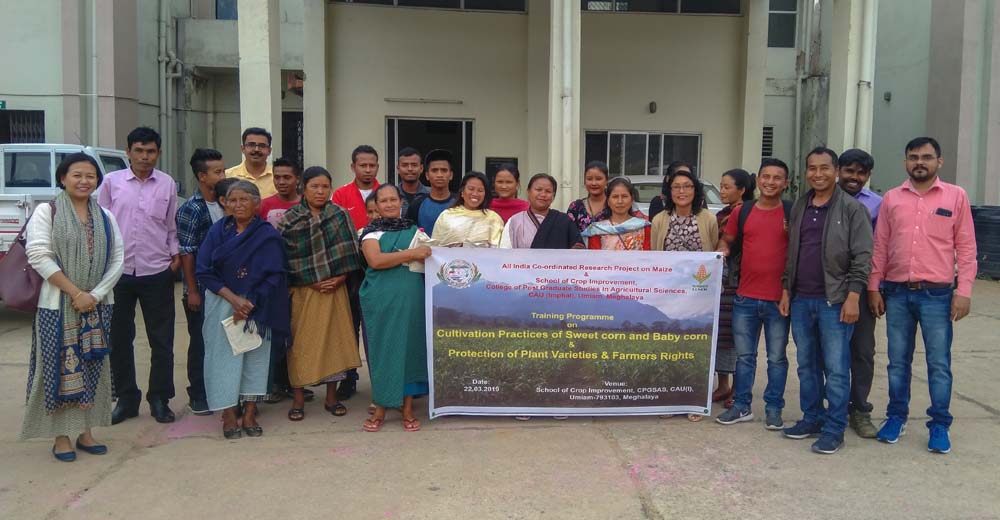
|
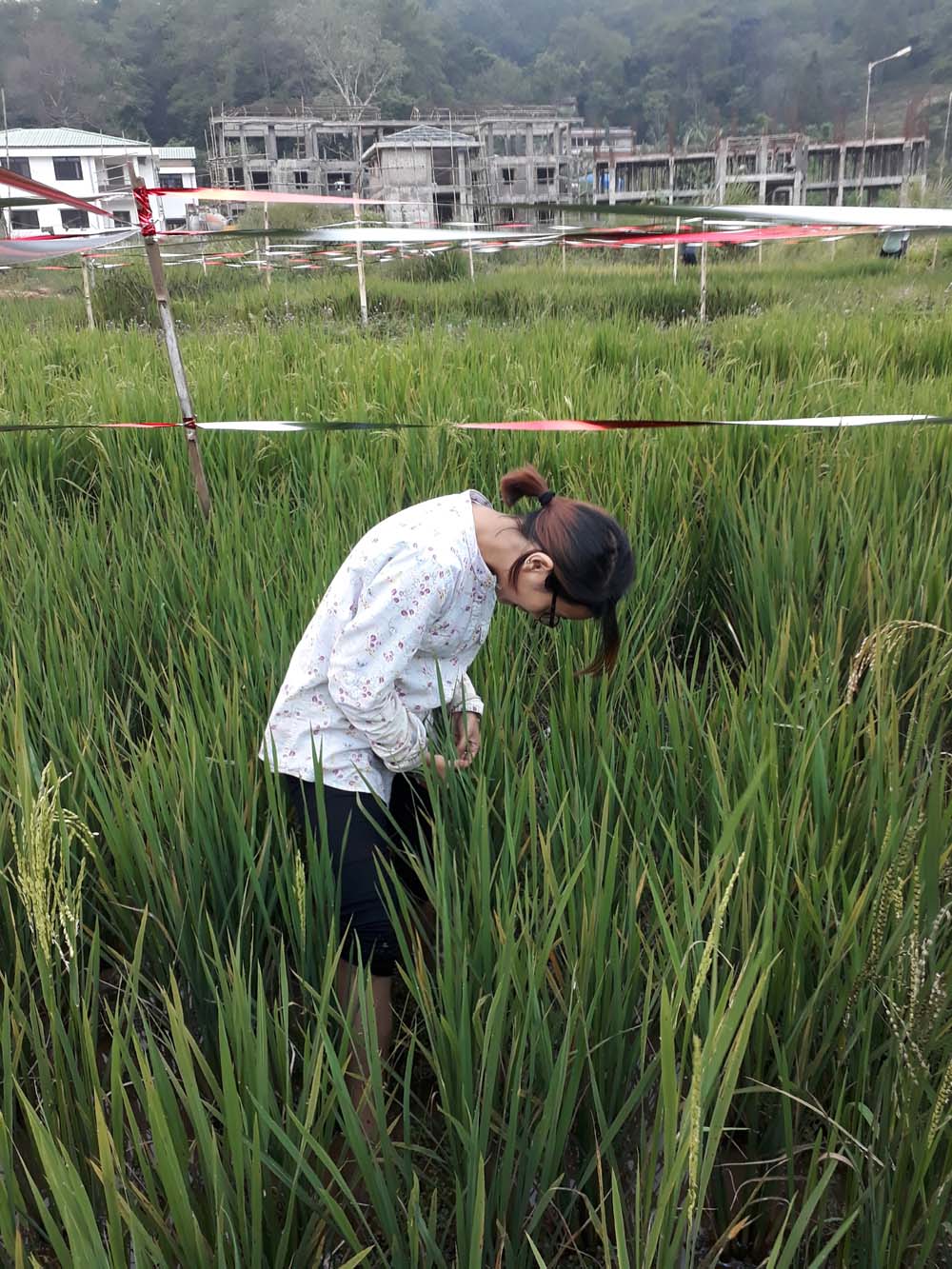
|
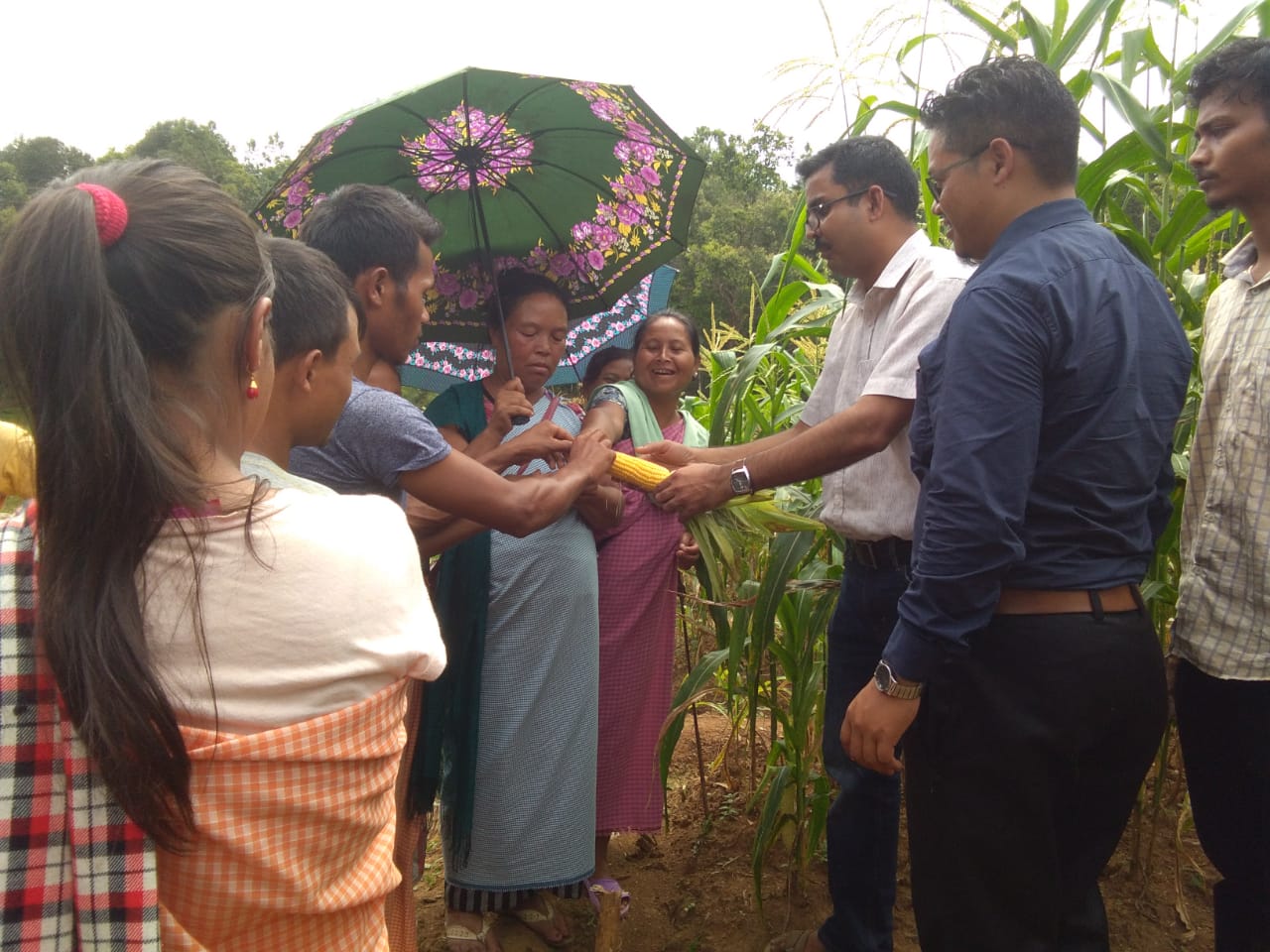
|
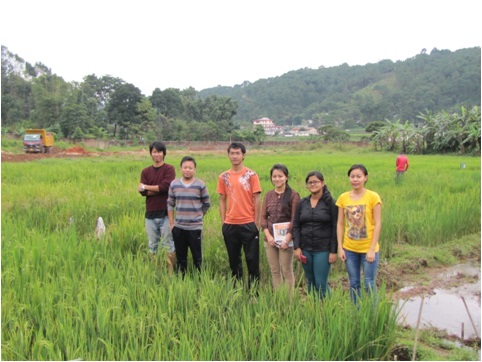
|
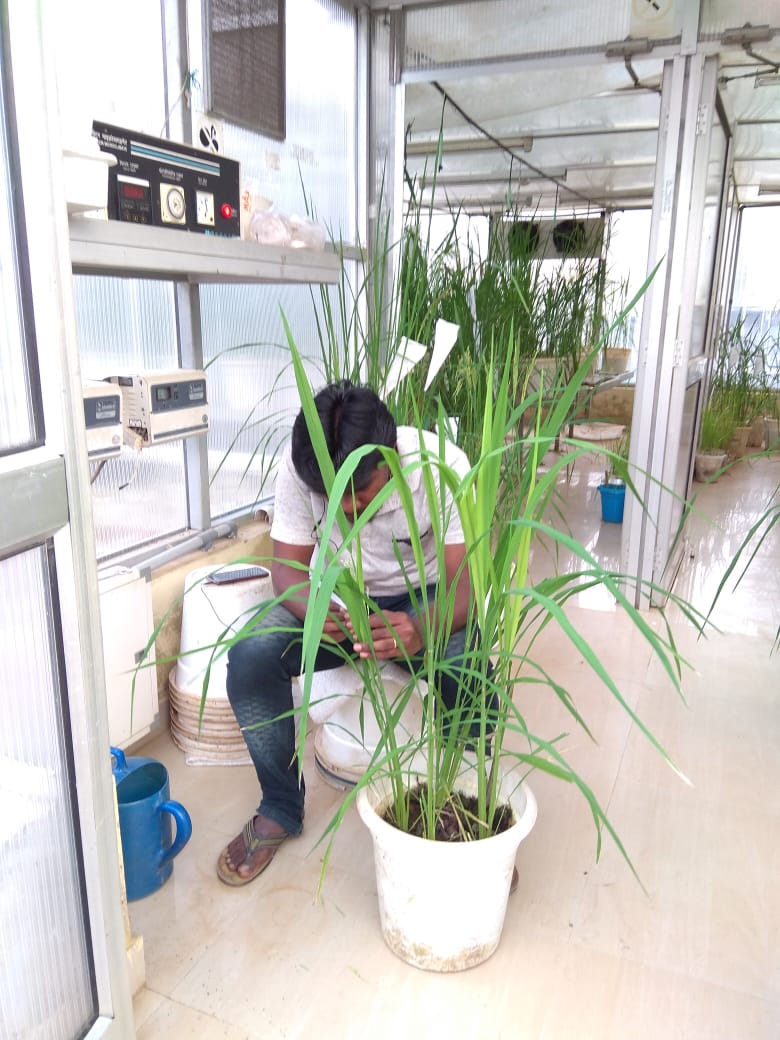
|
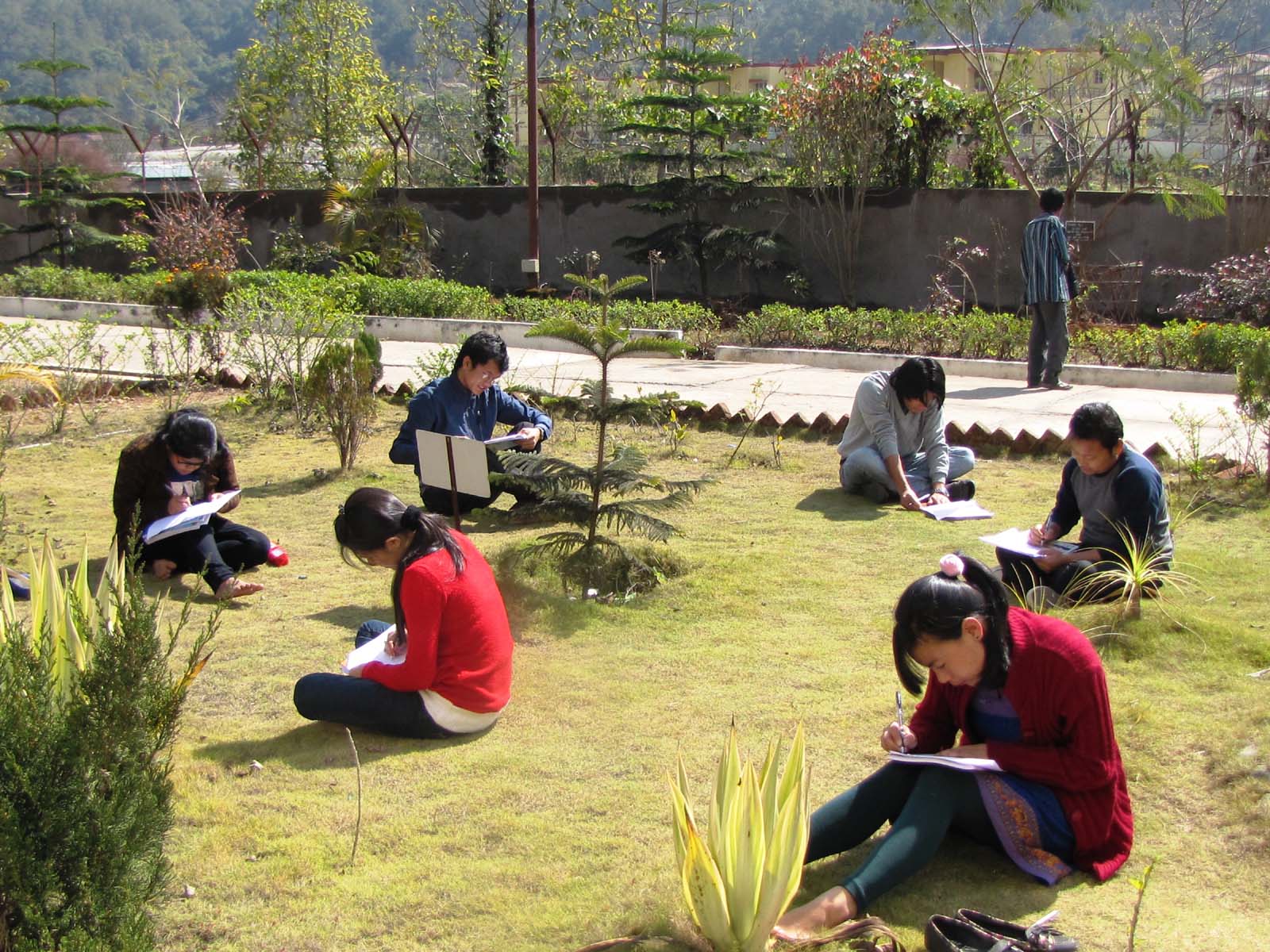
|
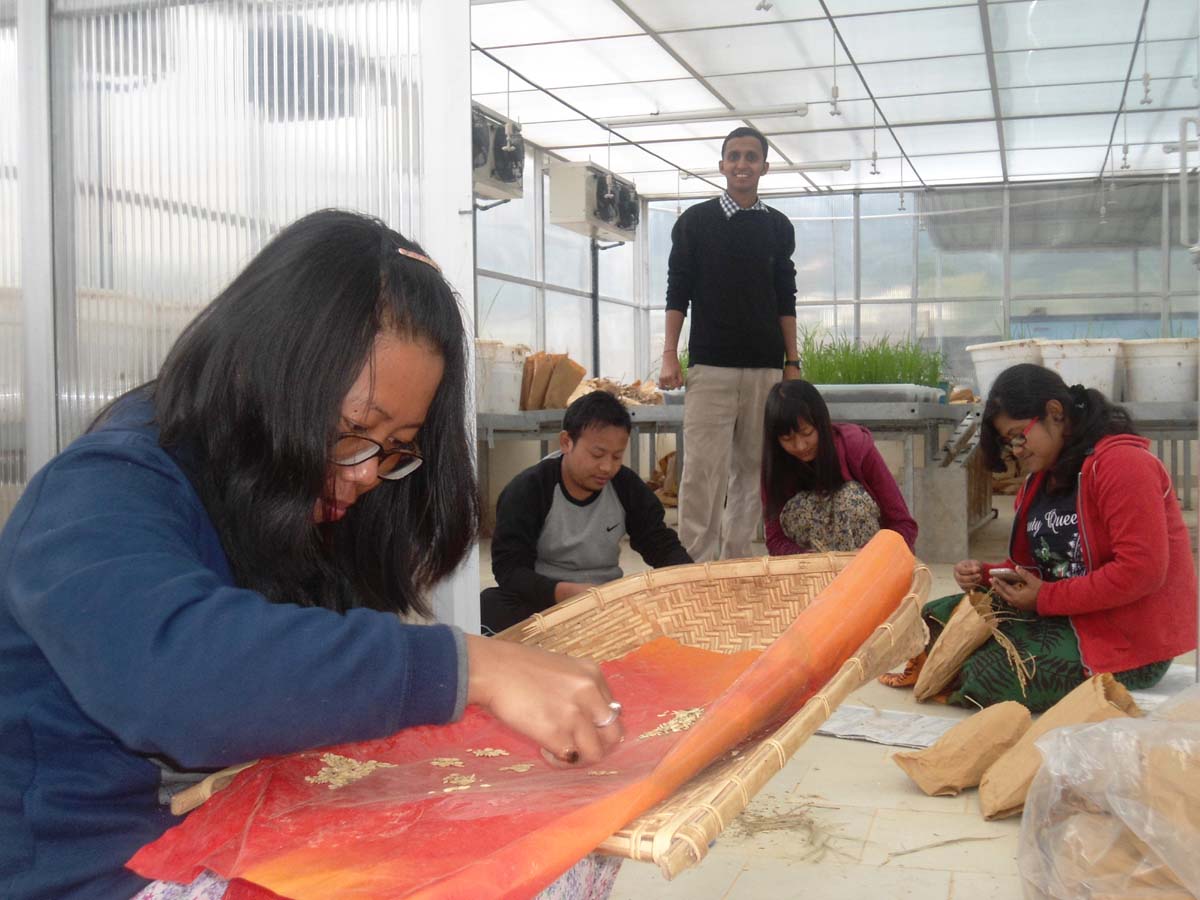
|
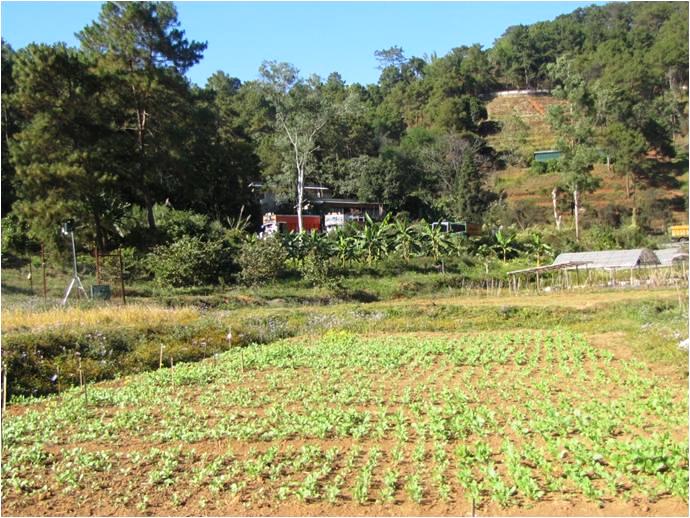
|
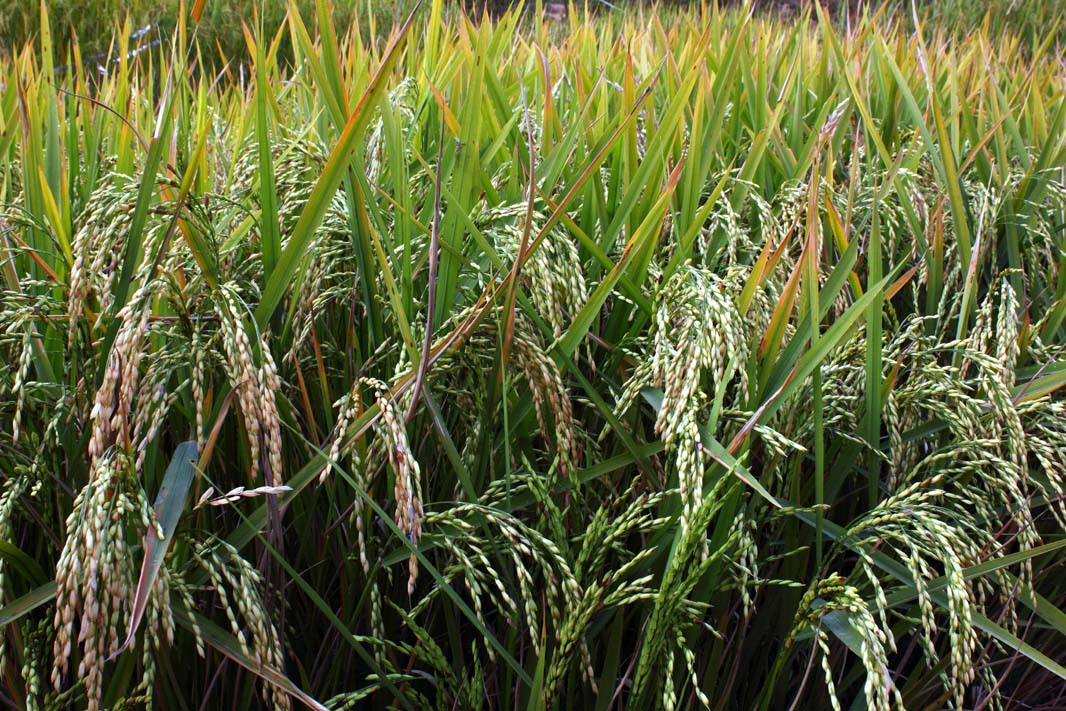
|
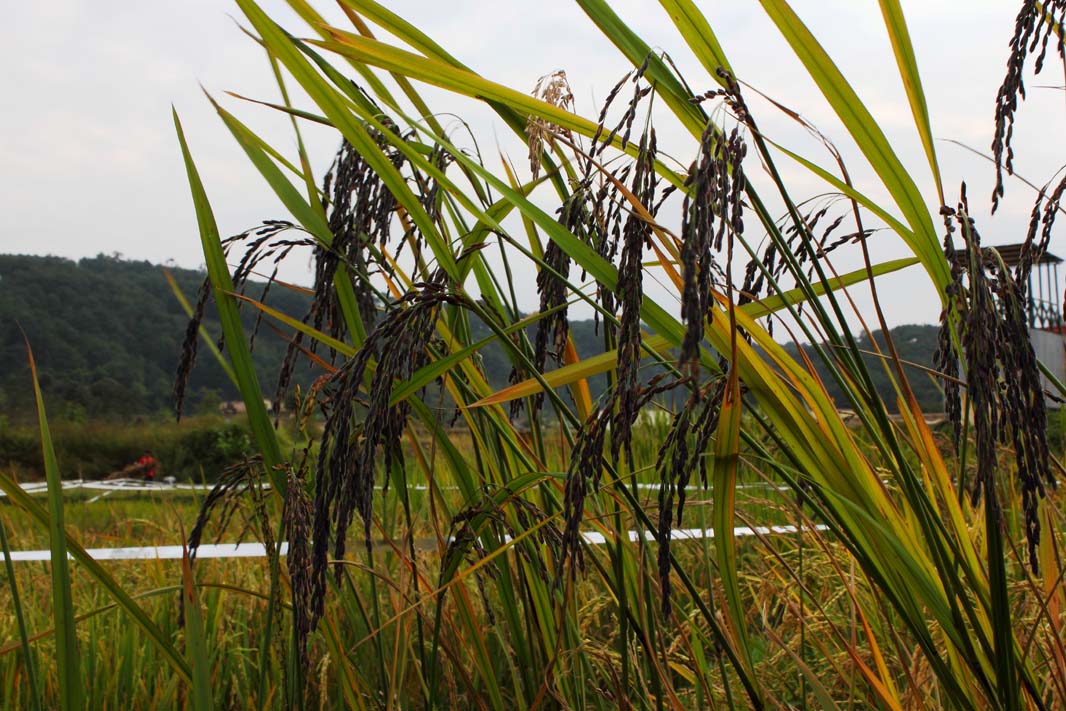
|
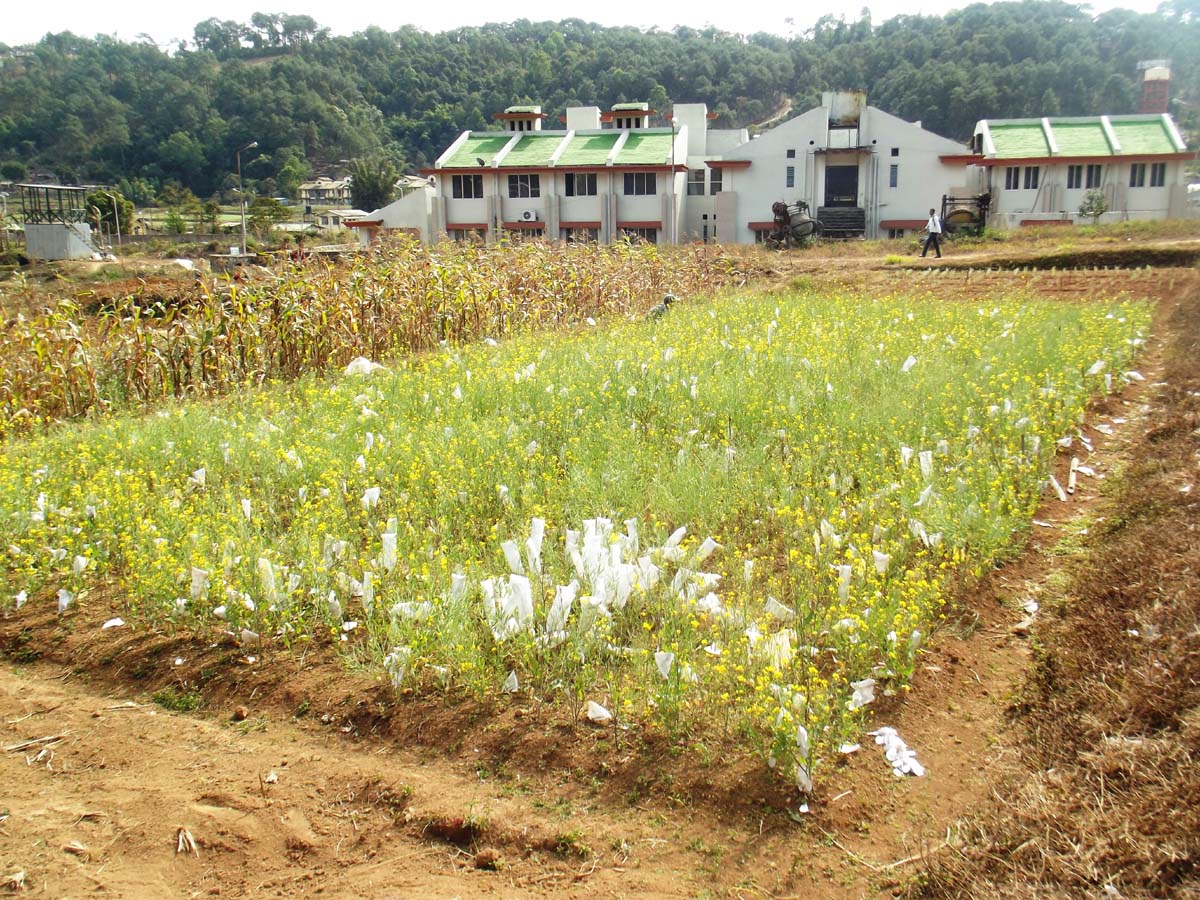
|
|
|
|
|
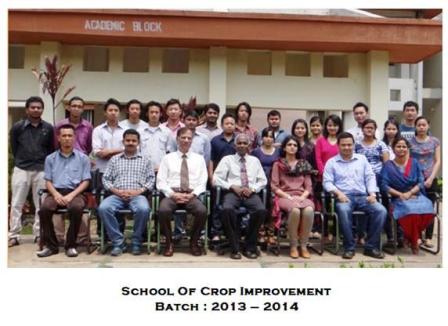
|
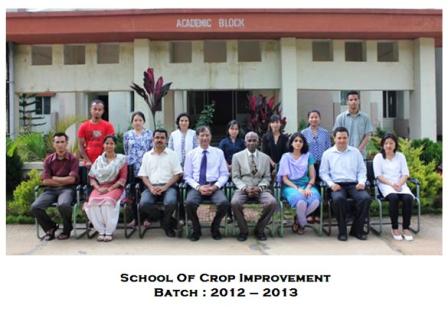
|






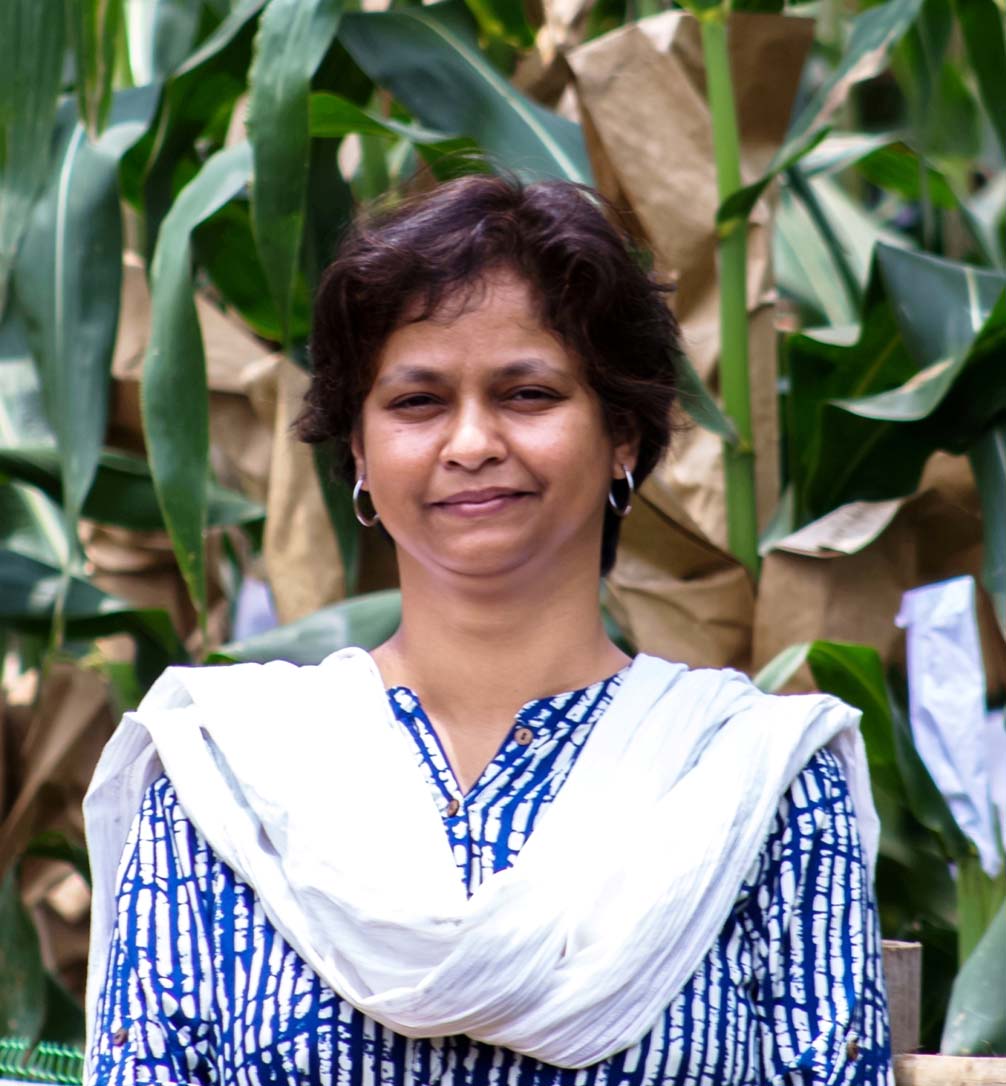

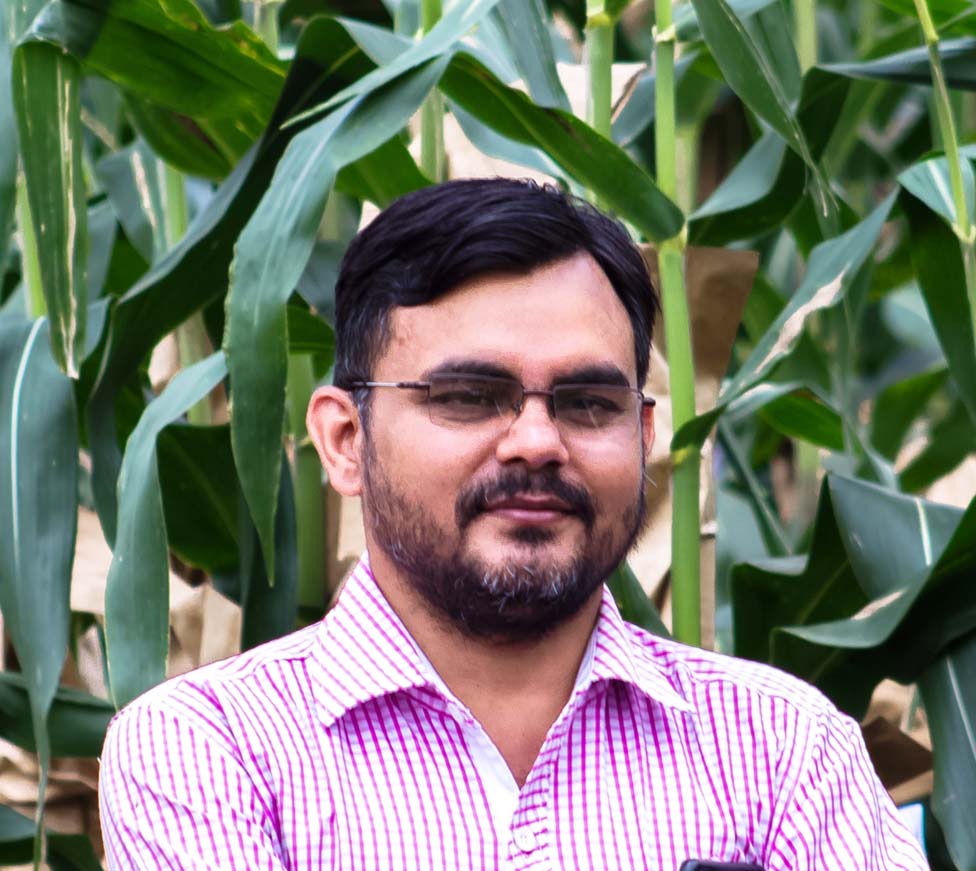


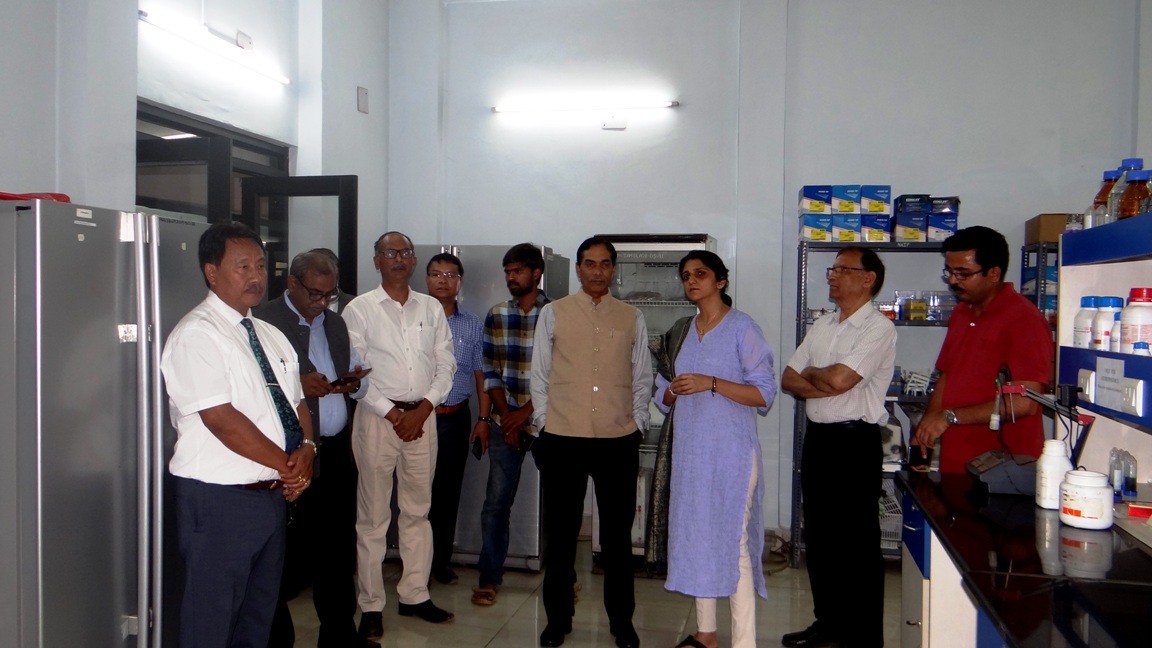 Visit of Dr. Trilochan Mahapatra, Hon'ble DG, ICAR and Secretary, DARE, GoI and Dr. Premjit Singh, Hon'ble Vice Chancellor, CAU-Imphal, to SCI Labs on 01-06-2019
Visit of Dr. Trilochan Mahapatra, Hon'ble DG, ICAR and Secretary, DARE, GoI and Dr. Premjit Singh, Hon'ble Vice Chancellor, CAU-Imphal, to SCI Labs on 01-06-2019
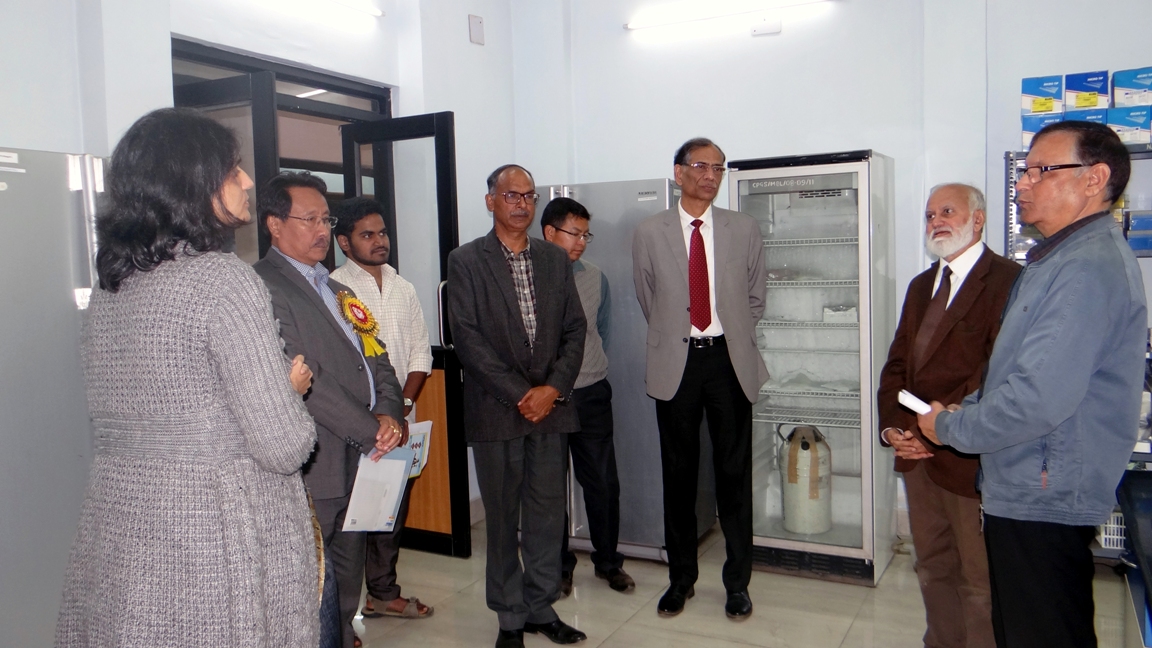 Visit of Dr S. Ayappan, Hon'ble Chancellor and Dr. Premjit Singh, Hon'ble Vice Chancellor, CAU-Imphal, to SCI Labs on 05-12-2018
Visit of Dr S. Ayappan, Hon'ble Chancellor and Dr. Premjit Singh, Hon'ble Vice Chancellor, CAU-Imphal, to SCI Labs on 05-12-2018
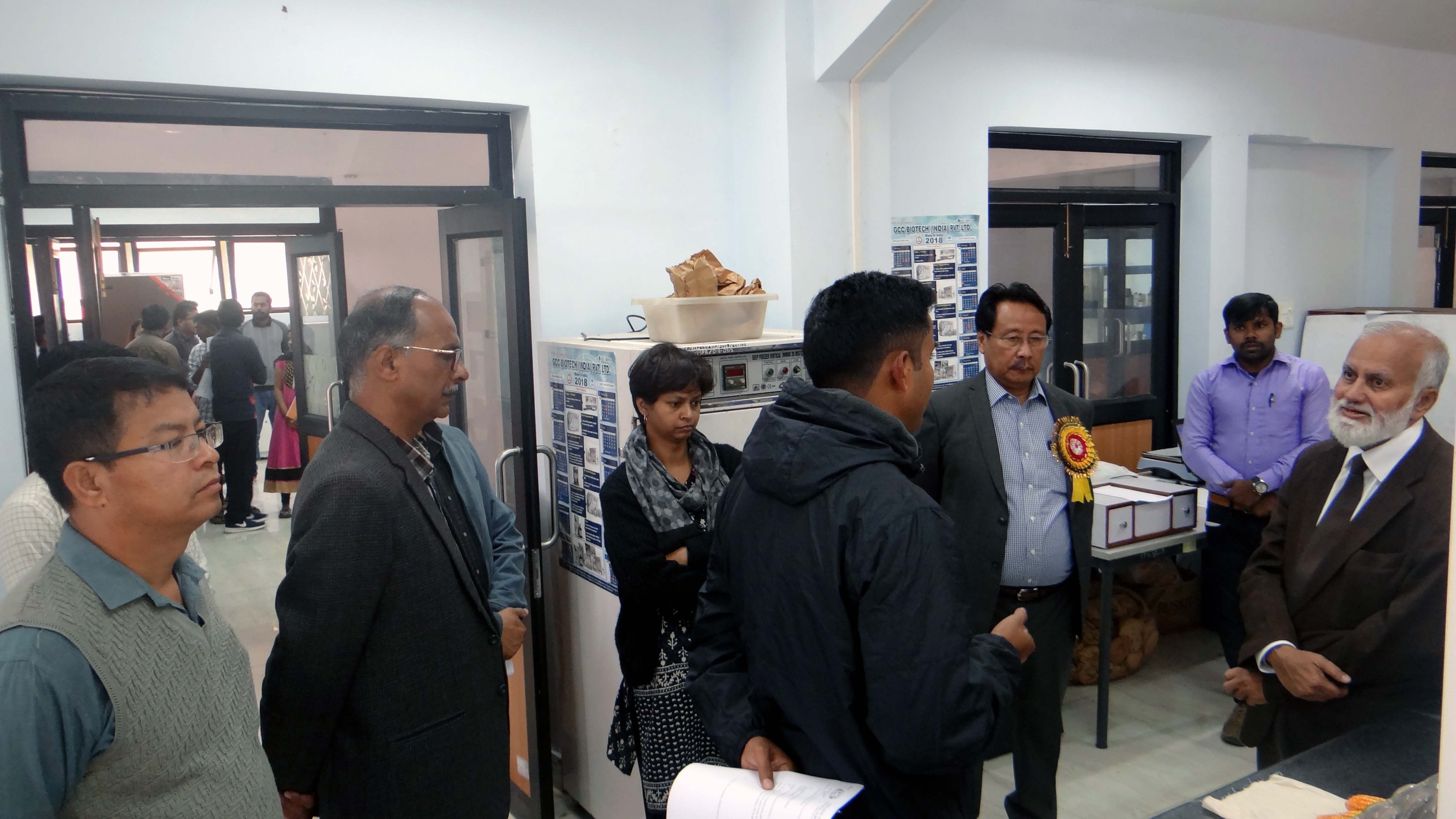 Visit of Dr S. Ayappan, Hon'ble Chancellor and Dr. Premjit Singh, Hon'ble Vice Chancellor, CAU-Imphal, to SCI Labs on 05-12-2018
Visit of Dr S. Ayappan, Hon'ble Chancellor and Dr. Premjit Singh, Hon'ble Vice Chancellor, CAU-Imphal, to SCI Labs on 05-12-2018
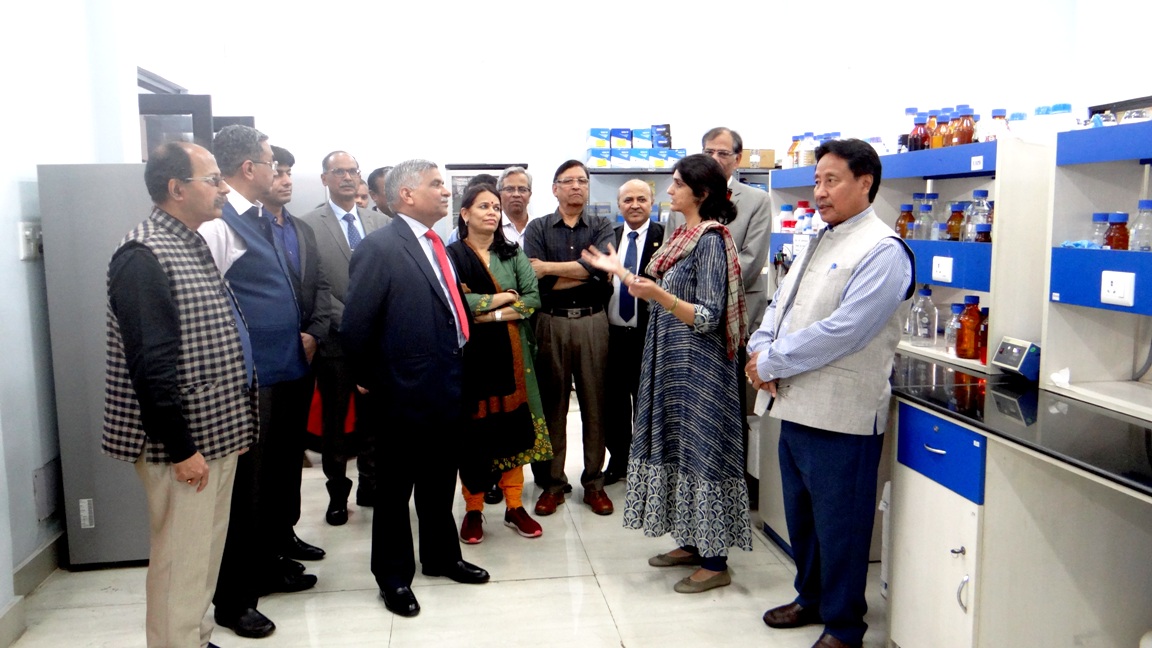 Visit of Shri Rajeev Sharma, CMD, PFC Ltd. and Dr. Premjit Singh, Hon'ble Vice Chancellor, CAU-Imphal, to SCI Labs on 11-05-2018
Visit of Shri Rajeev Sharma, CMD, PFC Ltd. and Dr. Premjit Singh, Hon'ble Vice Chancellor, CAU-Imphal, to SCI Labs on 11-05-2018
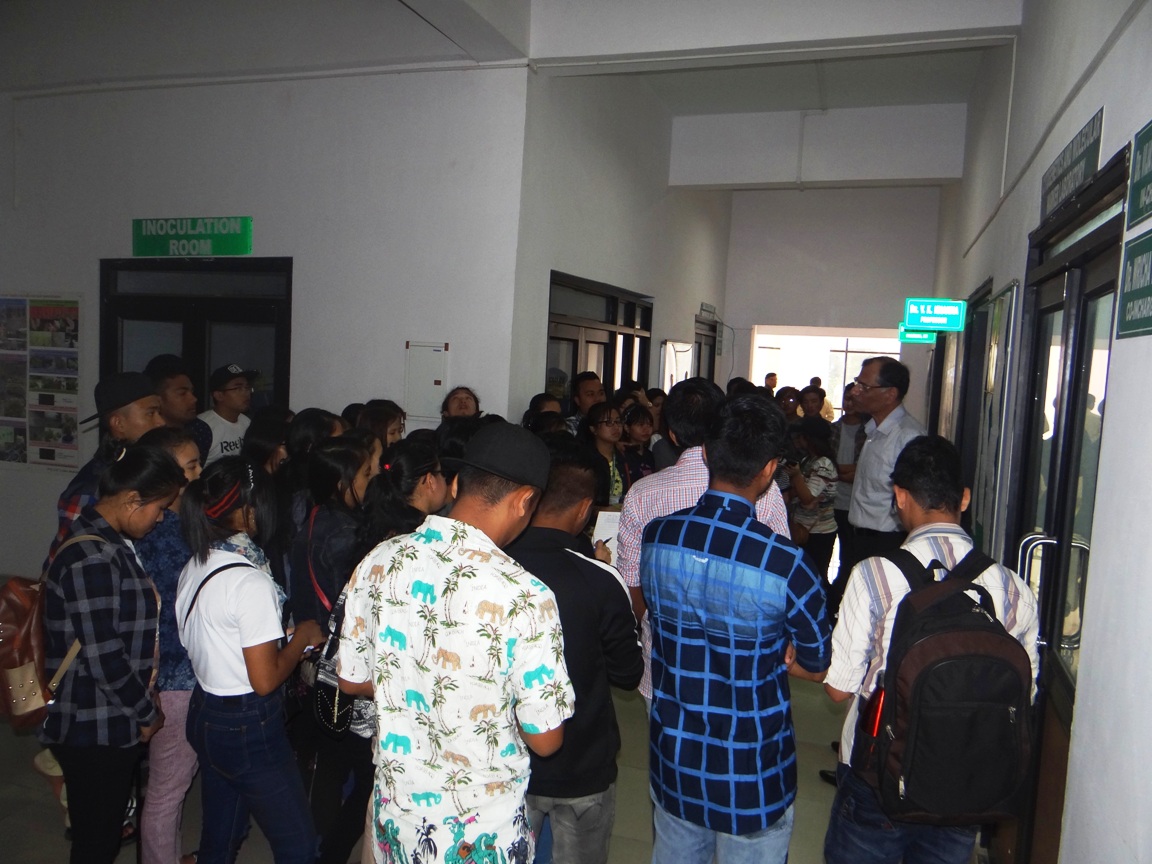 Visit of Students of CoA & CoFT, CAU, Imphal on 19-06-2017
Visit of Students of CoA & CoFT, CAU, Imphal on 19-06-2017
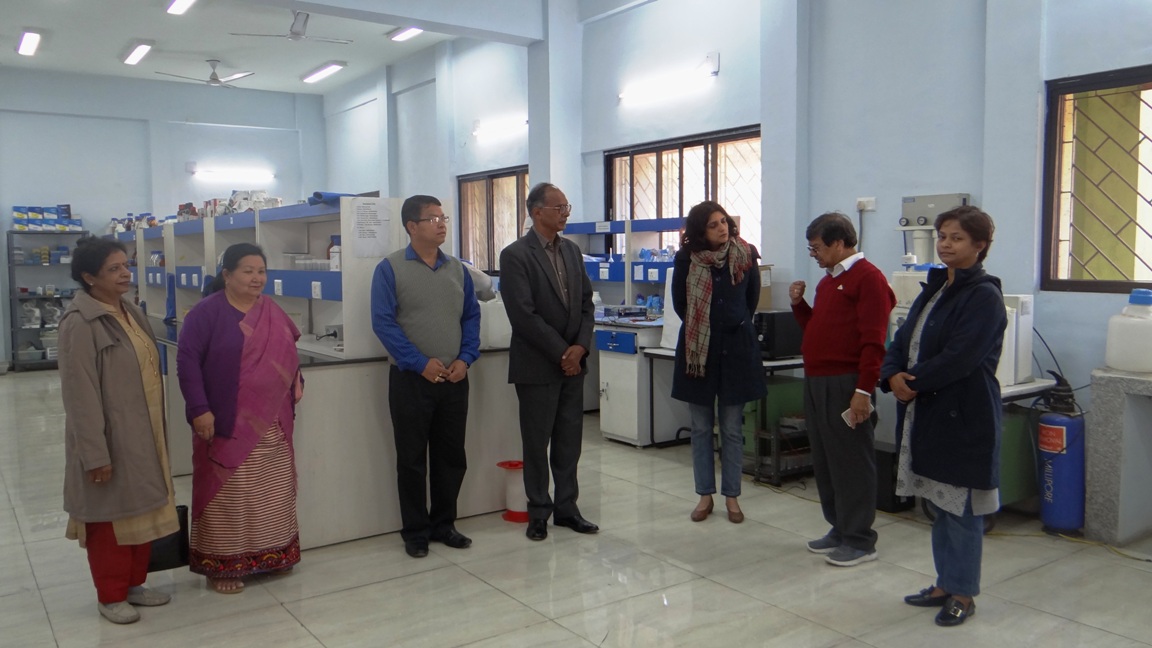 Visit of of Dr. H.S. Gupta, (former) Director, IARI on 12-12-2018
Visit of of Dr. H.S. Gupta, (former) Director, IARI on 12-12-2018
